- Directories

Humanitarian Engineering and Science
About the program: what is humanitarian engineering and science.
Humanitarian Engineering and Science (HES) is an interdisciplinary, sociotechnical graduate program where student scientists and engineers work directly with communities to jointly define problems and create sustainable solutions.
HES students choose from disciplinary tracks, including environmental engineering, geological engineering, geophysics, data science, and robotics. Students take a balance of track-specific courses and HES courses in the social sciences. Classroom, research, and project experiences prepare students to be leaders in a variety of fields.
Graduates have gone on to diverse careers in places like:
- Local startups and consulting
- United Nations
- US Geological Survey
- National Academy of Engineering
- Higher education and further graduate studies
Information
- Core Faculty
- Recent Graudate Success Stories
If you have questions or would like more information about the program, please contact Richard Krahenbuhl, Director of Humanitarian Engineering and Science programs, [email protected].
Choose From Five Impactful Disciplinary Tracks And a customizable interdisciplinary option
Environmental Engineering
Geological engineering, data science, interdisciplinary, degree options: thesis or professional.
Two Master’s Degrees : Students choose either a thesis or professional (non-thesis) master’s degree.
Thesis : This option typically takes two years, and:
- Requires 30 credit hours (equivalent to 10 courses), 6 of these credit hours dedicated to independent research
- Prospective students interested in the thesis option are encouraged to reach out the HES Graduate Program Director, Richard Krahenbuhl, [email protected], prior to submitting an application to learn more about this option, investigate projects and potential advisors
Professional : This option can be completed in one year, and:
- Requires 30 credit hours (equivalent of 10 courses), 3 of these credit hours dedicated to a practicum course
- Requires practicum instead of thesis research
Required Courses from the Engineering, Design, and Society Department (EDS): Students from all disciplinary tracks take the same core EDS courses, plus one elective
- EDNS 515: Introduction to Science & Technology Studies (3 credits)
- EDNS 577: Engineering and Sustainable Community Development (3 credits)
- EDNS 579: Community-Based Research (3 credits)
- EDNS 580: HES Capstone Practicum (3 credits) — only required for professional master’s degree
Graduate Certificate Option
The HES graduate certificate is designed for working professionals as well as graduate students who are enrolled in other degrees at Mines but wish to gain knowledge in humanitarian engineering and science. To obtain a graduate certificate, students must complete a minimum of 9 credit hours of core HES courses, most likely those listed below. Courses not listed below that align with the student’s needs and interests can be substituted in consultation with the HES Director. Students may not double-count courses from their undergraduate degrees. Students who have already taken one of the classes as undergraduates must find a suitable replacement, to be approved by the HES Director.
Application Requirements for Master's Degree
- Background in engineering or physical sciences. A degree in these fields is not required. However, courses will require prerequisites. Consult each of the track descriptions for more specific requirements.
- Statement of purpose, curriculum vitae or resume, and transcripts for post-secondary degrees.
- Three letters of recommendation are required for students pursuing the thesis option, but not for students pursuing the non-thesis option .
- Non-native English speakers must prove language proficiency. Please review requirements provided by the graduate admissions office .
- Mines undergraduate students may include up to 6 credits from their undergraduate program counted toward a combined BS/MS degree (4+1). External applicants may transfer graduate credit from elsewhere with written permission from the HES program director.
- Applications are directed through the graduate admissions office .
Funding & Scholarships
Hesa scholarships.
Humanitarian Engineering and Science Ambassadors (HESA) scholarships of up to $10,000/year for up to two years are available for students who meet particular income and unmet need requirements. Apply to the HES program by March 1 to be considered and email Kevin Moore ( [email protected] ) for more information on HESA-specific application requirements.
SHULTZ fellowships
Apply by March 1 to be considered for a limited number of Shultz graduate fellowships. Email [email protected] for complete up-to-date information.
Teaching Assistantships
Prospective students who apply by March 1, as well as continuing students, will be considered for a limited number of teaching assistant (TA) positions to begin in the following fall semester.
Other Funding Opportunities
We hire students to work as hourly graduate assistants to grade for courses. Faculty members will hire students as research assistants (RA) when research projects are secured. Once enrolled at Mines, students may search for on-campus positions in Diggernet.
Outside Scholarship Opportunities
There are many options for finding support for your graduate studies. Click here for a spreadsheet the HES Program has compiled that may have some items of interest. Some may no longer be active so please check with the primary source for complete details. The Mines Financial Aid office may have other lists of such opportunities, so please check with the Financial Aid office for additional information.
STUDENT ORGANIZATIONS
Mines without borders.
Mines Without Borders combines Engineers Without Borders USA and Bridges to Prosperity . EWB-USA is committed to bringing sustainable development projects to the developing world. Projects include water, waste-water, sanitation, energy, and shelter construction. EWB-Mines helps underserved communities abroad that request specific engineering expertise. EWB-Mines is currently working in Nicaragua to help villages install suspended cable bridges — giving access to schools, hospitals, and markets during the rainy season. B2P builds literal bridges in under-served communities worldwide. On the Mines campus, B2P and Engineers Without Borders have now merged and students can build bridges by joining EWB/B2P at Mines.
Socially Responsible Scientists & Engineers (SRSE)
Socially Responsible Scientists and Engineers (SRSE) is the new Humanitarian Engineering student club!
Are you looking for professional and individual development outside of the classroom in understanding what it means to be a socially responsible scientist and/or engineer? SRSE is focused on just that. With plans to host student and faculty presentations, professional speakers, an annual symposium, and opportunities for networking and attending conferences we can further discuss what social responsibility in engineering is and how we can encourage it in others.
Geoscientists Without Borders
Mines geophysics students have the opportunity to take part in projects supported by Geoscientists Without Borders, founded in 2008 by the Society for Exploration Geophysicists (SEG) Foundation. The program seeks not only to accomplish humanitarian goals, but also to involve next-generation scientists in worthy causes.
Students in the Department of Geophysics have participated in such GWB-sponsored projects as working in an international cohort of students to assist people in Thailand in learning geophysical methods to address local environmental and infrastructural problems. Most recently, a team of Mines Geophysics students, led by Dr. Jeffrey Shragge, collaborated with students and faculty at a local university, assisting them with building low-cost geophysical instruments to gain a better understanding of and manage water quality in Benin, West Africa.
Learn more about the Geoscientists Without Borders Program
Association of Environmental and Engineering Geologists
The Colorado School of Mines Student Chapter of Association of Environmental and Engineering Geology (AEEG) is a professional organization that helps promote personal advancement within the engineering geology profession.
Geophysics Student Organizations
Society of student geophysicists (ssg).
The goal of the SSG shall be to promote interest in and knowledge of geophysics and allied sciences, and to promote friendship and cooperation among those interested in the geophysical sciences. We are affiliated with the Society of Exploration Geophysicists (SEG) and Colorado School of Mines.
Society of Women in Geoscience
The goal of the Society of Women in Geoscience is to foster a supportive community for the undergraduate, graduate, and faculty women of the various geoscience disciplines (Geophysics, Geology and Geologic Engineering, Petroleum, Hydrology, Environmental, Petrophysics, Geochemistry, and more) at the Colorado School of Mines. Through our involvement on campus, we hope to bridge the gap that sometimes exists between geoscientists in different fields of study, while at the same time creating both personal and professional networks for our women on campus. Our club offers regular meetings, networking events, professional development, field trips, and casual meet and greet events for our members.
Society of Geophysics Graduate Students (SGGS)
The purpose of the SGGS is to represent the Department of Geophysics graduate students in the Mines Graduate Student Government, to coordinate and collaborate with the Department on matters of concern to its graduate student body, and to promote goodwill and community among all graduate students.
Learn more about the Geophysics student organizations
Welcome to E4C.
Sign Into Your Account
Forgot Password?
Remember Me
Don't have an account? Sign Up
Applications Open: Humanitarian Engineering and Science Grad Program at the School of Mines
Use your STEM training to engage in community-focused development. Enroll in the Humanitarian Engineering and Science graduate program at the Colorado School of Mines.
Priority Application Deadline: March 1, 2024
Humanitarian Engineering and Science (HES) is an interdisciplinary, sociotechnical graduate program where student scientists and engineers work directly with communities to jointly define problems and create sustainable solutions.
The big challenges we face will not be solved by technology alone. They require a nuanced understanding of social systems and people.
The Humanitarian Engineering and Science graduate program at the Colorado School of Mines stands out in the growing field of humanitarian engineering by blending social science with STEM expertise. Students learn from social scientists, engineers, and applied scientists to gain a truly interdisciplinary understanding of applied humanitarian concepts. Students can choose from five disciplinary tracks:
- Data Science
- Environmental Engineering
- Geological Engineering
Students can also design a unique interdisciplinary specialty with the help of a faculty member.
Train for a Career with Impact
Mines has led the field of humanitarian engineering since establishing the country’s first undergraduate program in 2003. Program alumni have impactful careers in non-profits, government agencies, and the private sector. Meet three recent graduates and learn about their careers!
Students in the residential master’s program complete either a research-based thesis or a hands-on practicum with an external organization. A variety of options exist for financial support, including Humanitarian Engineering and Science Ambassador Scholarships for low-income students with unmet needs.
Learn More and Apply Today
Learn more about these and other opportunities by visiting our website or emailing [email protected] .
The priority application deadline to be considered for funding is March 1, 2024 , though we encourage you to submit your application as soon as you are ready. Apply today .
Share This Opportunity
Suggested Articles
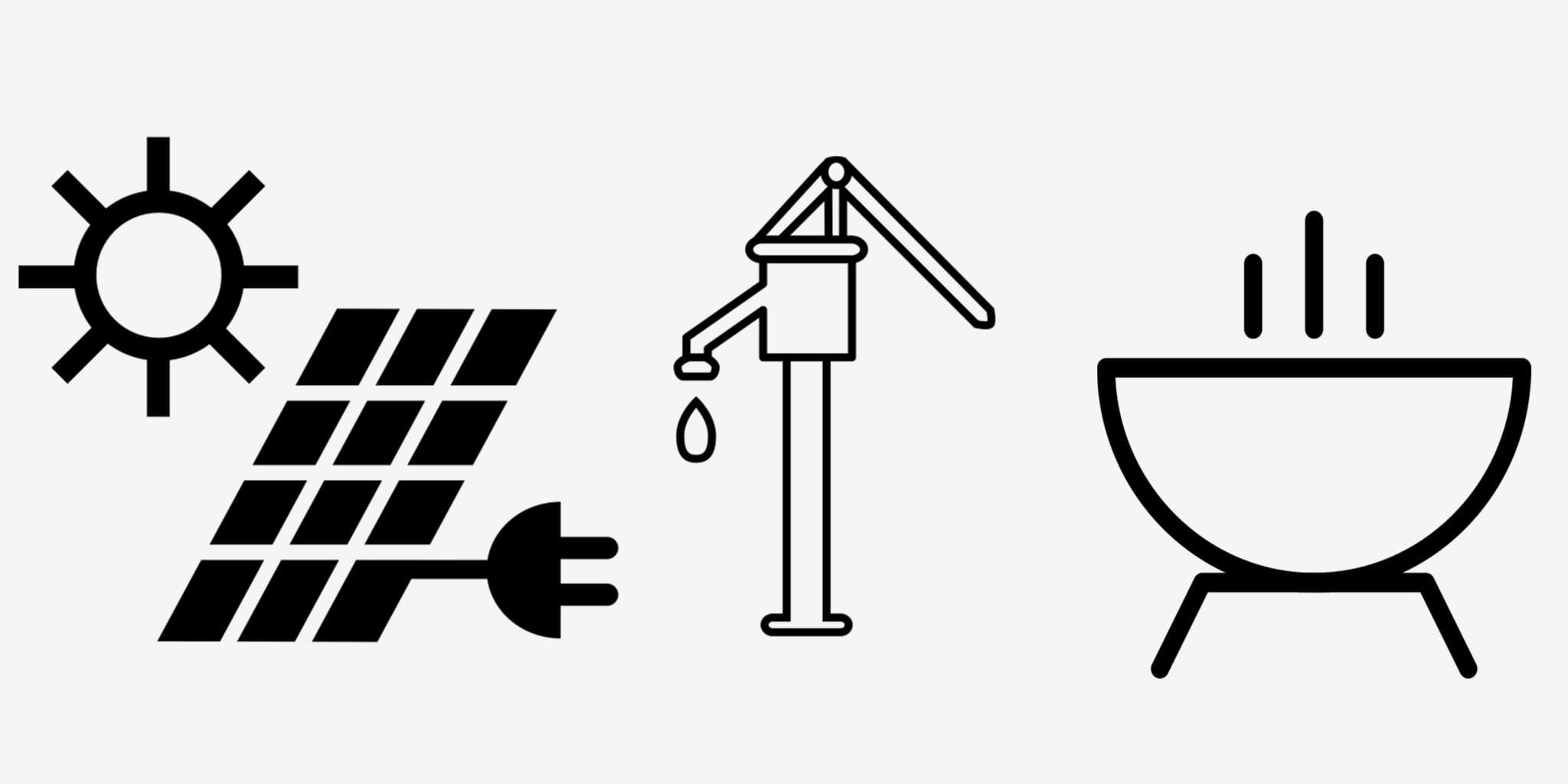
Humanitarian Engineering Principle Four: Be a Professional Humanitarian Engineer
This is the fourth in a series on principles based on the textbook Humanitarian Engineering: Creating Technologies that Help People, by Kevin Passino. This series is adapted by the author for Engineering...
Read Full Article
Join a global community of changemakers.

- COLLEGE OF ENGINEERING /
- Faculty and Research /
- Humanitarian Engineering and International Development
CENTER FOR HUMANITARIAN ENGINEERING AND INTERNATIONAL DEVELOPMENT
Established in 2020, Villanova’s Center for Humanitarian Engineering and International Development engages students in unique learning opportunities that reinforce engineering fundamentals, a commitment to life-long learning and service to society.
It positions the College and University among nationally recognized institutions that demonstrate excellence in education by creating innovative learning experiences with a global perspective.
With ethical engagement as its guiding principle, the Center will focus on three key program areas:
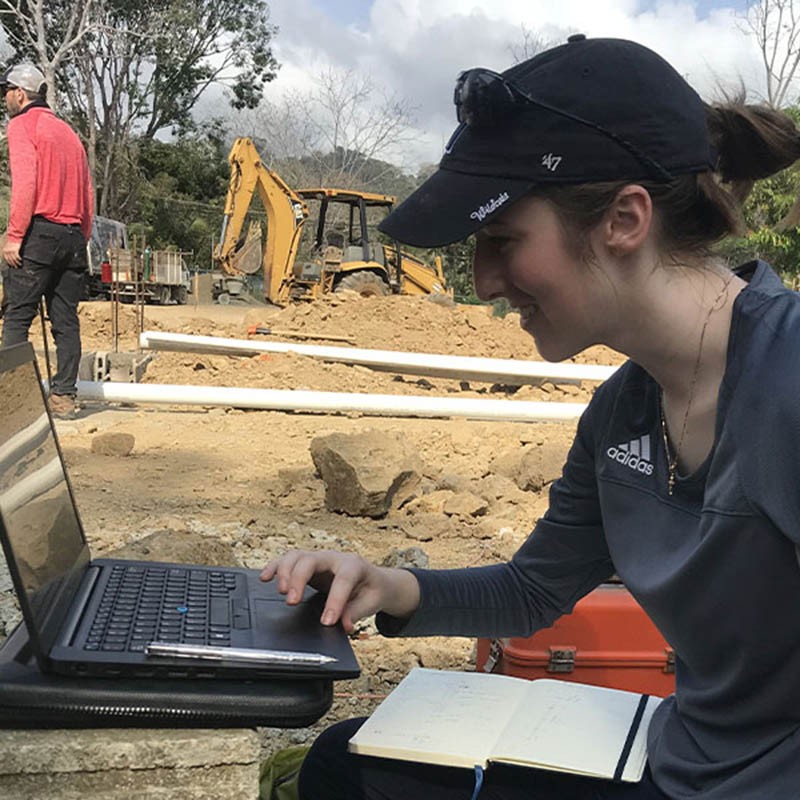
The Center delivers a rigorous curriculum in the context of global humanitarian issues through a new Humanitarian Engineering minor and an International Development track within the College’s Sustainable Engineering graduate program. Equipped with academic fundamentals and the engineering design process, students and faculty members will engage with global partners to address complex challenges that are rooted in ethical engagement.
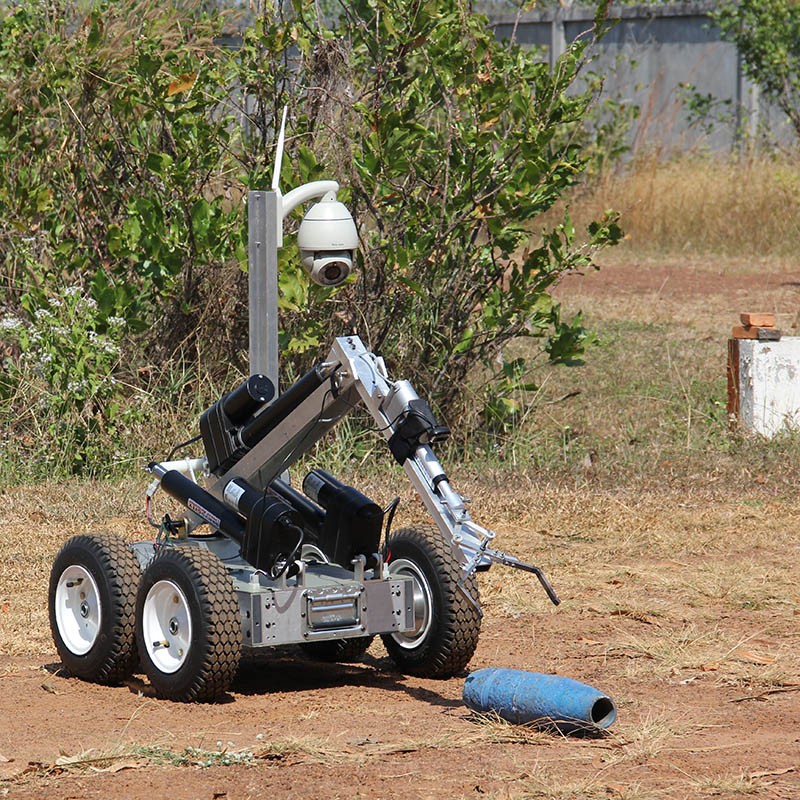
Research efforts are rooted in ethical engagement including appropriate coordination with international agencies and university compliance. The Center also provides new opportunities for multi-disciplinary collaborations and offers faculty the necessary support to successfully engage with international partners, funding agencies and field teams.
Current research initiatives:
- Water and sanitation infrastructure
- Humanitarian technologies
- Renewable energy resources
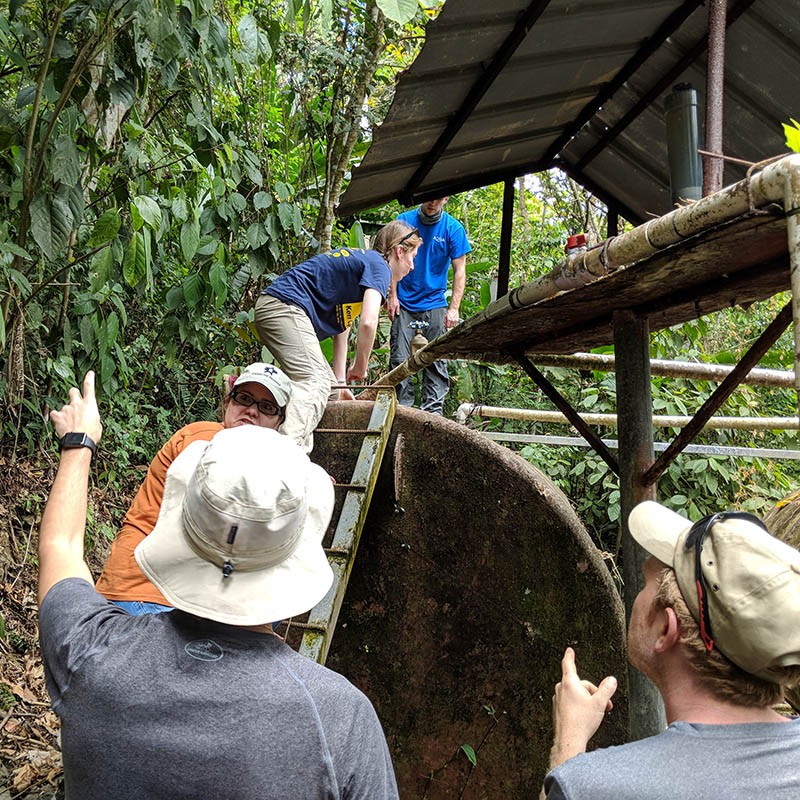
The Center is focused on building partnerships with in-country non-profit organizations involved in community development work—an effort that formally began in 2011 with the Villanova Engineering Service Learning (VESL) program. VESL currently provides opportunities for undergraduate and graduate engineering students to engage with program partners in 12 countries around the world. Engagement occurs at multiple levels across all departments and programs.
RELATED TOPICS
- Villanova Engineering Service Learning
- Humanitarian Engineering Minor
- Sustainable Engineering for International Development
Jordan Ermilio, Director Center for Humanitarian Engineering and International Development Phone: (610) 519-6859 Email: [email protected]
FEATURED FACULTY
Jordan ermilio center director, garrett clayton humanitarian technologies in cambodia, virginia smith water resources engineering, pritpal singh renewable energy solutions, iain hunt sustainable international development, the experience, daniel fetsko, civil engineering.
“This was without a doubt one of the most impactful experiences that I ever had. It was incredible to see the concepts that we learn in class applied to a scenario where we were able to use what we know to help others in a way that most people never get to experience.” MORE...
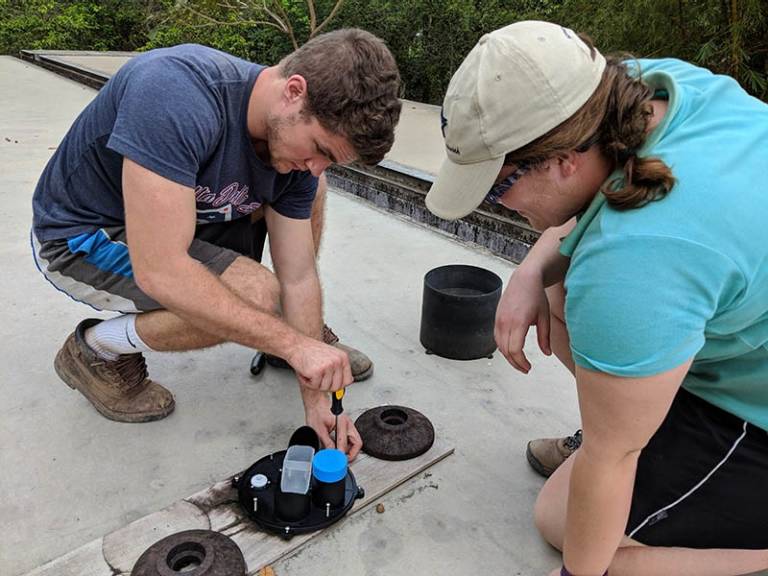
Elizabeth Cullen, Chemical Engineering and Fulbright Student Grant recipient
“I found that engineering and service could both be a big part of my experience at Villanova. Getting really involved in VESL was what gave me a big ‘a-ha’ moment and a vision of how I can continue to blend those interests in my career... I’ve found what I am passionate about.” MORE...
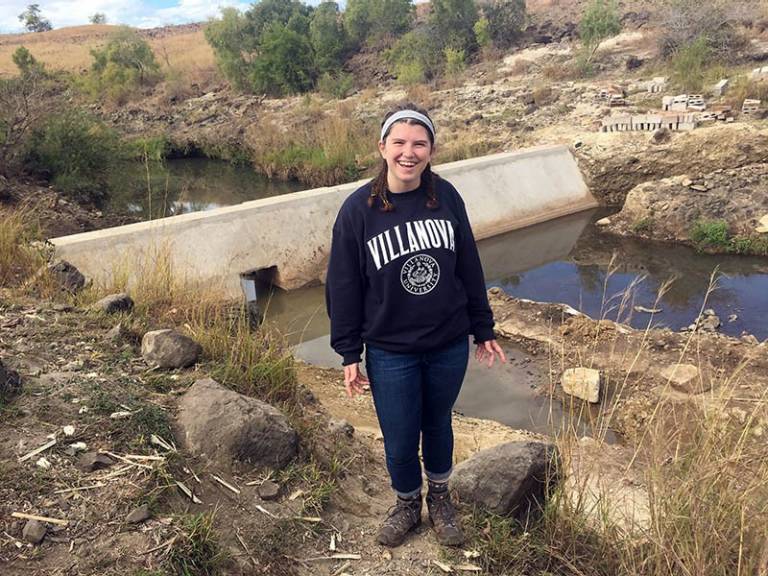
Myah Massenburg, Chemical Engineering
“While language can be a barrier between people, hands-on activities and learning through interactions are meaningful and powerful. I learned so much without ever exchanging words. I learned that family is important whether that be a traditional family or friends one has traveled with. A close-knit community will allow any idea or project to succeed because there are many people working diligently together. I recommend this experience to anyone looking for a challenge outside the classroom where you can directly see how projects and ideas will impact people’s lives.” MORE...
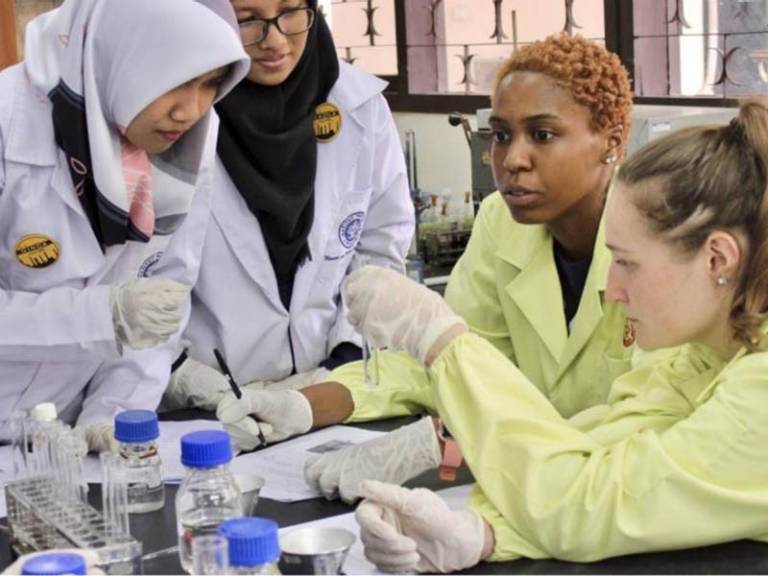
Assistant Professor of Mechanical Engineering Jim O’Brien
“At Villanova we want students to graduate understanding that they have a moral responsibility to improve the world and the lives of the people in it. This is especially important for engineers. These trips and the work associated with them give students experience using engineering for the betterment of mankind, and in the process of serving, they generally find that they gain more than they give.” MORE...
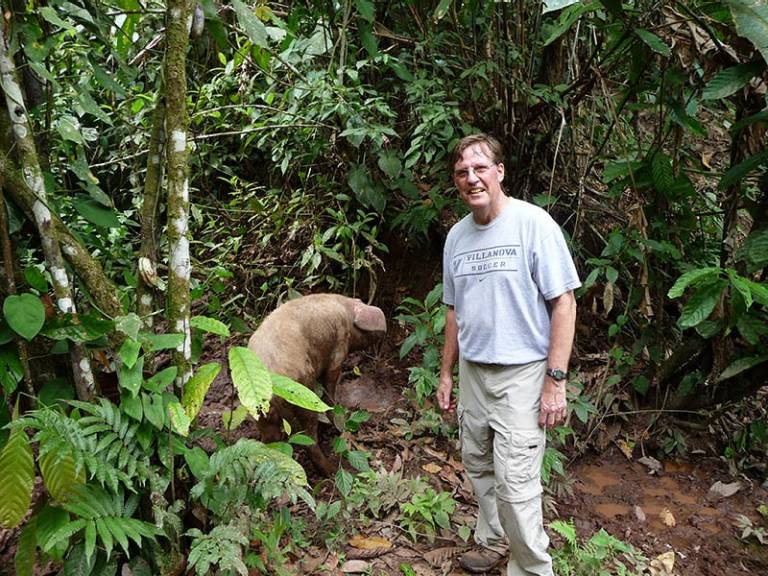
Samantha Schafer, Chemical Engineering
“My time in Panama yielded some of my favorite memories. My service there made me not only a better student of engineering, but of life. I encourage every student to take advantage of at least one of the many service trips offered through our great University, reap the rewards, and do what we Villanovans do best: Ignite Change!” MORE...
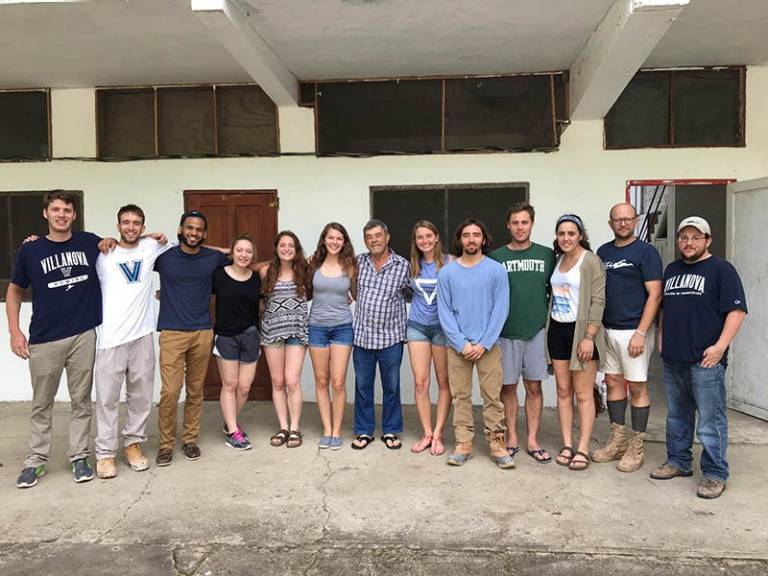
Shannon Becker, president, Aqua North Carolina
“This experience helps provide the students insight into the real world, outside of a textbook. I wish I would have had an opportunity like this VESL project while in school... I think it’s a great opportunity to partner with a prestigious university that also has a practical application as part of their program where they can reach out to the community and get real-life experience. Our connection with Villanova has enabled us to use them as a resource, whether it’s hiring students down the road or working with them in the community, I’m thankful for the opportunity to contribute and proud to say that I’m a part of this program.”
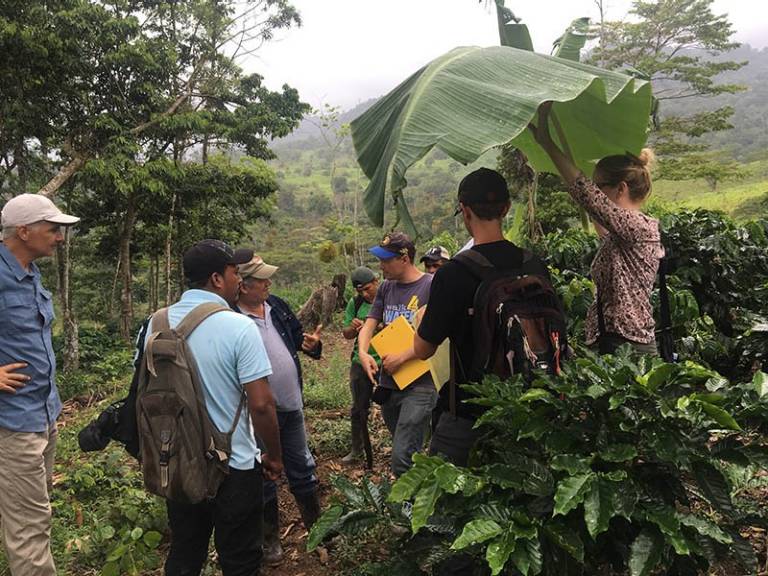
- Directories
- Humanitarian Engineering and Science
Graduate Program at Colorado School of Mines
Mines graduates make an impact on the world. With innovative science and engineering-based solutions, they help improve the human condition and quality of life in communities on local and global scales. And the Humanitarian Engineering and Science graduate programs at Mines provide the skills to make that impact last.
As a student in this program, you’ll gain the expertise, skills and hands-on experience to truly make a difference. Under the leadership of world-class faculty expertise in engineering, applied sciences and social sciences, you’ll graduate from Mines well-prepared for a successful career in development, corporate social responsibility or other areas that directly support the communities you seek to serve.
You’ll make an impact—one that will change lives all around the world.

Funding and scholarships available

International projects supporting sustainable community development

5 major research areas available
Requirements and Costs
- Admission Requirements
- Degree Requirements
- Cost of Attendance
Graduate Certificate
- Bachelor’s Degree : Required
- GRE : Not Required
- Letters of Recommendation : Not Required
- Resume or Curriculum Vitae (CV) : Required
- Statement of Purpose : Not Required. Suggested if GPA is less than 3.0/4.0
- Transcript(s) : Required. Must be submitted for all schools attended (unofficial transcripts accepted for admissions review and must show successful completion of any required prerequisite course(s).
- For international applicants or applicants whose native language is not English, please review the ENGLISH PROFICIENCY requirement
Master’s Non-Thesis
- Statement of Purpose : Required
Master’s Thesis
- Letters of Recommendation : Required – three letters
For additional information about these admissions requirements, please refer to the Admissions Requirements page
View the Mines Academic Catalog for more program-specific information
Humanitarian Engineering and Science Ambassadors (HESA) scholarships of up to $10,000/year for up to two years are available for students who meet particular income and unmet need requirements. Students should apply to the HES program to be considered for a HESA scholarship; no separate application is required. Email Kevin Moore for more information on HESA-specific application requirements.
*Allowance for fees based on mandatory fees charged to all students. Does not include fees for orientation, library, yearbook, refrigerator rental, voice messaging, etc.
At less than 4.5 credit hours, you may be ineligible for financial aid.
Request for additional information
Fill out this form to receive more information about this exciting program.
Career Outcomes
- Career Types
- Career Resources
- Not for profits
- Corporate social responsibility
- Stakeholder engagement
- Peace Corps
- International development
- Community engagement
- Engineering Service Corps
- Government agencies
Career Services
Degree Options
Master’s non-thesis.
- Humanitarian Engineering and Science
Master’s Thesis
Admissions deadlines.
Humanitarian Engineering
Eradicating poverty is not an act of charity, it is an Engineering and Scientific task.
Humanitarian Engineering aims to resolve problems in areas with serious structural or coincidental resource limitations and to cocreate appropriate solutions to better people's lives.
The University of Twente in its Shaping 2030 vision decides to be a university of technology that puts people first. We direct special attention to three societal themes and the challenges they pose, framed in a single question: How can we contribute to the development of a fair, sustainable and digital society between now and 2030?
From an Humanitarian Engineering Perspective, our goal is ambitious and twofold: we are setting up a Humanitarian Engineering Master Programme that could support our existing research lines in Humanitarian Engineering.
Engineering for sustainable community development provides an approach for engineers to cooperatively work with people on location to identify needs and resources, develop technology solutions, and assess impact.
Humanitarian Engineering is an joint initiative of the three faculties Engineering Technology (ET) , Geo-Information Science and Earth Observation (ITC) and Behavioural, Management and Social Sciences (BMS) .
Education and Research play an equally important role in Higher Education Institutions such as Universities. Their intertwining is one of the main driving factors for each of our scientific topics embraced at the UT. We want to train students for leading our tomorrow society and at the same time we want to push forward research boundaries for improving our society. The Humanitarian Engineering field is not an exception.
Trying to get close to the established and challenging target "zero poverty" does require both engineers with specific interdisciplinary skills and researchers that are able to analyse the basic problems of areas affected by crisis and offer valuable but simple and efficient solutions. Therefore, we want to become the reference point in Europe for both research and educational aspects of Humanitarian Engineering.
With Humanitarian Engineering we combine engineering with social science. We believe that both social and technical solutions are needed to tackle complex humanitarian challenges. One of the main ones being poverty alleviation.
Key domains
The Master programme will focus on three main domains that represent its backbone:
Humanitarian Aid Engineering is all about immediate responses in times of need. You can think of, for example, quick solutions for water supply, communication connections, first de-mining actions, or flexible and modular facilities. At UT we focus on developing engineering innovations to serve humanity, especially in the direction of more vulnerable and underserved communities.
Resilience Engineering is about long-term planning and capacity building. You can think of, for example, maintenance planning, education facilities, robust infrastructures, but also context and cultural awareness and co-creation. At UT we focus on a synergetic and common effort to increase the well-being and the global sustainable growth by significantly decreasing disaster risk.
Responsible and Sustainable Entrepreneurship is about the implementation and value creation from technology in a local and volatile context. You can think of, for example, job creation and small-scale economy planning.
Stay up to date about Humanitarian Engineering
In our podcast, our Humanitarian Engineering group introduces humanitarian engineering actions and their importance to society. We talk with our guests about initiatives that develop engineering solutions that promote the well-being and lives of people lacking access to fundamental resources. We release one episode per month.
Latest news & events
- Tools & Services
- Chemical, Biological, and Environmental Engineering
- Civil and Construction Engineering
- Electrical Engineering and Computer Science
- Mechanical, Industrial, and Manufacturing Engineering
- Nuclear Science and Engineering
- Biological & Ecological Engineering
- Alumni & Partners
Humanitarian Engineering
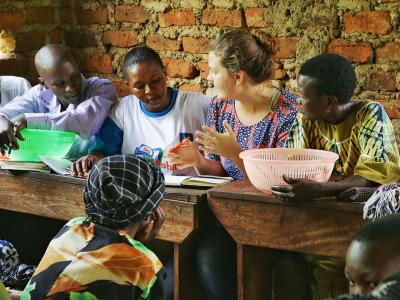
Request Information
Description
Humanitarian engineering applies science- and engineering-based solutions to improve quality of life in local and global communities by increasing the availability of basic human needs — such as clean water and sustainable energy, economic resilience, and disaster mitigation.
The curriculum for the humanitarian engineering minor focuses on education, service learning models, academic research, and local/global research. Our faculty have provided leadership and initiative in humanitarian engineering for many years. As a reflection of that commitment, we offer expanded opportunities for students to participate in hands-on, high-impact service-learning projects that provide lasting benefits for partner communities.
Oregon State is well suited to harness education and empower students to engage in solving global development problems because of our tradition of interdisciplinary research and education, a campus ethos of engaged service, faculty dedication, and growing student interest.
Undergraduate Information
Undergraduate minor.
Requirements
HEST advising sheets
HEST advising sheet 2022-2023
HEST advising sheet 2021-2022
To enroll in the minor or request consideration for substitutions for the requirements, please contact Brett Jeter in 238B Rogers Hall, 541-737-7991 or email him via [email protected] . We note that MyDegrees does not do a good job of aligning coursework with the minor requirements, please contact Brett Jeter for assistance. Nordica MacCarty can also be contacted via nordica.maccarty@oregonstate. edu to assist with substitutions/overrides.
If you are interested in the minor, a good place to start is to select your Bacc Core courses from the humanitarian engineering, science and technology (HEST) playlist. Courses marked by a "+" are specifically recommended because of the relevance of the material or because they are taught by a HEST-affiliated faculty member. Note that HEST310, HEST320, and HEST 412/512 are all currently approved to fill Bacc Core requirements for any student on campus.
Sample courses and requirements
- Innovation for Social Impact
- Intro to Community Engagement and Community-Based Design
- Engineering for Global Health Solutions
- UAV Engineering
- Multidisciplinary Case Studies in Humanitarian Engineering, Science and Technology
Full requirements
Undergraduate certificate (online)
Knowing how to develop and implement solutions that give underserved populations the resources and services they need to improve their quality of life is increasingly vital.
As a student in Oregon State University’s online Undergraduate Certificate in Humanitarian Engineering, you will equip yourself with the knowledge to make a genuine, lasting impact on the people who need it most, both locally and globally.
Clubs and organizations
- Engineers Without Borders - Oregon State University
Search all clubs
Have a question about a club? Ask the Engineering Student Council .
Graduate Information
Graduate opportunities.
While we do not offer a transcript-visible graduate program option, graduate students from disciplines across campus can participate in the humanitarian engineering program.
Related Stories
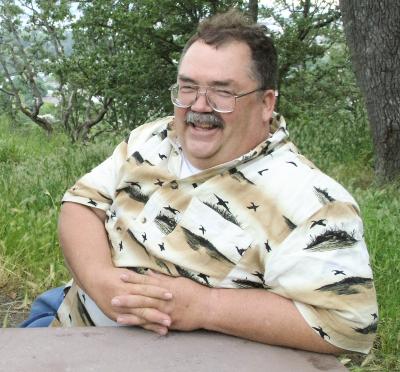
Humanitarian Engineering - School of Engineering Education - Purdue University

Humanitarian Engineering
Humanitarian engineers focus the skill and capabilities of engineering theory and practice toward aiding the greater good of humanity by offering stakeholder centric solutions to medical and disaster relief, global outreach, human displacement, human safety, food security, cultural awareness/sensitivity, and economic development.
Engineers from this concentration may work in industries such as : the not for profit sector, faith-based charities, NGO’s (i.e. global aid/global health), international development, as well as state, federal and international government agencies.
Their work may include: leading research and data analysis in problem topics to develop novel approaches to reduce risk and improve outcomes, to developing and designing improved water and sanitation systems, .to project and supply chain management around aid distribution, supply route repair. The focus of work will always engage a range of stakeholders with many competing interests ranging from time to monetary, religious, geopolitical, raw material and sustainability constraints.
Plan of Study
Humanitarian Engineering (PDF)
Student and Alumni Stories
Student Highlight: Spring '21 Senior Ashley Foltz, Humanitarian Engineer in the Multidisciplinary Engineering Degree Program
Interdisciplinary Engineering 2017 Colloquium
On November 9, 2017, Purdue University College of Engineering faculty panelists discussed the nature of humanitarian engineering across engineering design initiatives, emerging economies, and as global competencies and challenges at the 2017 Interdisciplinary Engineering Colloquium.
Watch the Introduction to our 2017 Colloquium:
Part II discusses the need and growth of Humanitarian Engineering (highlights Angela Collins, MDE Alumna '18)
Last Updated: February 15, 2021
- Skip to Content
- Catalog Home
- Institution Home
- Programs A-Z
- Courses A-Z
- Academic Calendar

- Undergraduate
- General Information
- The Graduate School
- Admission to the Graduate School
- Student Life at Mines
- Registration and Tuition Classification
- Academic Regulations
- Tuition, Fees, Financial Assistance
- General Requirements
- Departmental Graduate Programs
- Advanced Energy Systems
- Additive Manufacturing
- Carbon Capture, Utilization, and Storage
- Data Science
- Finite Element Analysis (FEA)
- Geochemistry
- GIS & GeoInformatics
Humanitarian Engineering and Science
- Hydrologic Science and Engineering
- Materials Science
- Nuclear Engineering
- Operations Research with Engineering
- Quantitative Biosciences and Engineering
- Quantum Engineering
- Space Resources
- STEM Teaching
- Underground Construction and Tunnel Engineering
- Combined Undergraduate/Graduate Degree Programs
- Directory of the School
- Policies & Procedures
- Previous Catalogs/Bulletins
- Catalog Addendum
- Catalog Home /
- Interdisciplinary Graduate Programs /
- Graduate Certificate in Humanitarian Engineering and Science
- Master of Science in Humanitarian Engineering and Science (Thesis and Non-Thesis options).
Program Description
The MS degrees in Humanitarian Engineering and Science (HES) are a professional MS (non-thesis) and a thesis-based MS. These degrees are targeted to recent graduates or mid-career professionals with a BS in science and engineering who are interested in careers, research opportunities, and/or acquiring skills that will help them work effectively with communities. The degrees include a core HES curriculum plus an approved track of related courses in a science or engineering discipline.
The HES graduate certificate is designed for professionals seeking to attend school part-time or students who are seeking degrees in other departments at Mines but still desire graduate training in humanitarian engineering and science. It consists of four courses.
In both the master’s degrees and graduate certificate, a unique mix of social science, applied science, and engineering perspectives prepares students to apply knowledge about the earth to promote more sustainable and just uses of water, energy, and other earth resources and to understand and mitigate potential hazards.
To achieve the Master of Science (MS) degree, students may elect the Non-Thesis option, based exclusively upon coursework and a practicum, or the Thesis option. The thesis option is comprised of coursework in combination with individual research performed under the guidance of two faculty advisors and presented in a written thesis approved by the student’s committee. HES students have academic advisors from both the Engineering, Design & Society Department and their disciplinary track (Data Science, Environmental Engineering, Geological Engineering, Geophysics, Robotics or Interdisciplinary). The thesis-based MS usually takes two years to complete, while the non-thesis MS can often be completed in one year.
For more information on program curriculum please refer to the HES website: https://humanitarian.mines.edu/mshes/ .
PRIMARY CONTACT
Richard Krahenbuhl 303.384.2329 [email protected]
Program Director
Richard Krahenbuhl, Associate Research Professor, Geophysics
Associate Program Director
Elizabeth Reddy, Assistant Professor, Engineering, Design & Society
Assistant Professor, Engineering, Design & Society
Dorit Hammerling, Associate Professor
Department of Civil & Environmental Engineering
Junko Munakata Marr, Professor and Department Head
Director of Computer Science
Thomas Williams, Associate Professor, Director of MIRROR Lab
Department of Engineering, Design & Society
Stephanie Claussen, Research Professor
Alina Handorean, Teaching Professor
Marie Stettler Kleine, Assistant Professor
Juan Lucena, Professor and Director, Humanitarian Engineering Undergraduate Programs
Carrie McClelland, Teaching Professor
Kevin Moore, Professor and Executive Director of Humanitarian Engineering Undergraduate Programs
Dean Nieusma, Associate Professor and Department Head
Elizabeth Reddy, Assistant Professor
Jessica Smith, Professor
Department of Electrical Engineering
Kathryn Johnson, Professor
Department of Geology and Geological Engineering
Paul Santi, Professor
Department of Geophysics
Richard Krahenbuhl, Associate Research Professor
Jeffrey Shragge, Associate Professor
Department of Humanities, Arts & Social Sciences
Jon Leydens, Professor
Department of Mining Engineering
Nicole Smith, Assistant Professor
Affiliate Faculty
Chris Anderson, Principal of Yirri Global
Graduate Certificate Program Requirements
The Humanitarian Engineering and Science (HES) certificate is an online or residential program designed for working professionals as well as graduate students who are enrolled in other degrees at Mines but wish to gain knowledge in humanitarian engineering and science. To obtain a graduate certificate, students must complete a minimum of 9 credits of the following courses. Students may not double-count courses from their undergraduate degrees. Students who have already taken one of the classes as undergraduates must find a suitable replacement, to be approved by the HES Director. Students are encouraged to take 12 credits of coursework if possible, adding an elective from the Approved HES electives list below.
Required HES certificate courses (9 credits):
| INTRODUCTION TO SCIENCE AND TECHNOLOGY STUDIES | 3.0 | |
| ADVANCED ENGINEERING AND SUSTAINABLE COMMUNITY DEVELOPMENT | 3.0 | |
| COMMUNITY-BASED RESEARCH METHODS | 3.0 | |
| Total Semester Hrs | 9.0 | |
Master of Science (MS) Program Requirements
The MS degrees in Humanitarian Engineering and Science (HES) are a professional MS (Non-Thesis) and a Thesis-based MS. These degrees are targeted to recent graduates or mid-career professionals with a BS in science and engineering who are interested in careers, research opportunities, and/or acquiring skills that will help them work effectively with communities. The degrees include a core HES curriculum plus an approved track of related courses in a science or engineering discipline. A unique mix of social science, applied science, and engineering perspectives prepares students to apply knowledge about the earth to promote more sustainable and just uses of water, energy, and other earth resources and to understand and mitigate potential hazards.
Master of Science (Non-Thesis)
To obtain the 30 credits required for the MS (Non-Thesis), students must satisfy the following program requirements: (1) 12 credits of required HES courses; (2) 3 credits of elective HES courses approved by Engineering, Design & Society; and (3) 15 credits of courses (400 or 500+ level) approved by the affiliated Department (see the 6 Tracks detailed below).
HES MS (Non-Thesis) Core Courses (15 credits):
| INTRODUCTION TO SCIENCE AND TECHNOLOGY STUDIES | 3.0 | |
| ADVANCED ENGINEERING AND SUSTAINABLE COMMUNITY DEVELOPMENT | 3.0 | |
| COMMUNITY-BASED RESEARCH METHODS | 3.0 | |
| HUMANITARIAN ENGINEERING AND SCIENCE CAPSTONE PRACTICUM | 3.0 | |
| ELECTIVE | An approved HES elective from the list below | 3.0 |
| Total Semester Hrs | 15.0 | |
Approved HES Electives:
| CORPORATE SOCIAL RESPONSIBILITY | 3.0 | |
| ENGINEERING CULTURES IN THE DEVELOPING WORLD | 3.0 | |
| ENGINEERING AND SOCIAL JUSTICE | 3.0 | |
| ANTHROPOLOGY OF DEVELOPMENT | 3.0 | |
| RISKS IN HUMANITARIAN ENGINEERING AND SCIENCE | 3.0 | |
| LIFE CYCLE ASSESSMENT | 3.0 | |
| ONSITE WATER RECLAMATION AND REUSE | 3.0 | |
| SITE REMEDIATION ENGINEERING | 3.0 | |
| SUSTAINABLE ENGINEERING DESIGN | 3.0 | |
| AIR POLLUTION | 3.0 | |
| MINING AND THE ENVIRONMENT | 3.0 | |
| WATER AND WASTEWATER TREATMENT | 3.0 | |
| RECLAMATION OF DISTURBED LANDS | 3.0 | |
| CHEMICAL FATE AND TRANSPORT IN THE ENVIRONMENT | 3.0 | |
| WATERSHED SYSTEMS MODELING | 3.0 | |
| ANALYSIS OF ENVIRONMENTAL IMPACT | 3.0 | |
| PROJECT MANAGEMENT | 3.0 | |
| INTERCULTURAL COMMUNICATION | 3.0 | |
| ENVIRONMENTAL COMMUNICATION | 3.0 | |
| INTERCULTURAL COMMUNICATION | 3.0 | |
| RISK COMMUNICATION | 3.0 | |
| SCIENCE, TECHNOLOGY, AND SOCIETY | 3.0 | |
| ENVIRONMENTAL JUSTICE | 3.0 | |
| ENERGY AND SOCIETY | 3.0 | |
| MINE MANAGEMENT | 3.0 | |
| MINING TECHNOLOGY FOR SUSTAINABLE DEVELOPMENT | 3.0 | |
| FUNDAMENTALS OF MINING AND MINERAL RESOURCE DEVELOPMENT | 3.0 | |
| MINE RISK MANAGEMENT | 3.0 | |
| SUSTAINABLE DEVELOPMENT AND EARTH RESOURCES | 3.0 | |
| ENERGY, NATURAL RESOURCES, AND SOCIETY | 3.0 | |
| ENVIRONMENTAL LAW AND SUSTAINABILITY | 3.0 |
Disciplinary Tracks
Track 1: geophysics (gpgn) (15 credits):.
Degree candidates should have an undergraduate degree in geophysics, physics, quantitative earth sciences and engineering, or equivalent coursework. In addition, candidates will need to complete necessary prerequisite courses for the graduate courses.
In addition to the Core HES MS (Non-Thesis) curriculum (15 credits) detailed above, MS (Non-Thesis) students following the Geophysics track must take one required course (3 credits) and at least 12 credits of approved elective courses, as shown below. Courses not listed below that align with the student's practicum can be substituted in consultation with the degree advisor.
| Required Course | ||
| HUMANITARIAN GEOSCIENCE | 3.0 | |
| At least four courses of the following: | ||
| ELECTRICAL AND ELECTROMAGNETIC EXPLORATION | 3.0 | |
| APPLICATIONS OF SATELLITE REMOTE SENSING | 3.0 | |
| ADVANCED HYDROGEOPHYSICS | 3.0 | |
| INSTRUMENTAL DESIGN IN APPLIED GEOSCIENCES | 3.0 | |
| GEOLOGICAL DATA ANALYSIS | 3.0 |
Track 2: Environmental Engineering (CEEN) (15 credits):
A BS degree in a science or engineering discipline is required. Pre-requisites include two semesters of college calculus, one semester of college physics, two semesters of college chemistry, and one semester of college statistics.
In addition to the Core HES MS (Non-Thesis) curriculum (15 credits) detailed above, MS (Non-Thesis) students following the Environmental Engineering track must take three required courses (9 credits) and at least two courses (6 credits) of approved elective courses, as shown below. Courses not listed below that align with the student's practicum can be substituted in consultation with the degree advisor.
| Required Courses: | ||
| HUMANITARIAN GEOSCIENCE | 3.0 | |
| PRINCIPLES OF ENVIRONMENTAL CHEMISTRY | 3.0 | |
| CHEMICAL FATE AND TRANSPORT IN THE ENVIRONMENT | 3.0 | |
| At least two courses of the following: | ||
| MOLECULAR MICROBIAL ECOLOGY AND THE ENVIRONMENT | 3.0 | |
| ENVIRONMENTAL GEOMICROBIOLOGY | 3.0 | |
| MICROBIAL PROCESSES, ANALYSIS AND MODELING | 3.0 | |
| ONSITE WATER RECLAMATION AND REUSE | 3.0 | |
| WATER AND WASTEWATER TREATMENT | 3.0 | |
| HAZARDOUS WASTE SITE REMEDIATION | 3.0 | |
| MINE WATER AND ENVIRONMENT | 3.0 | |
| LIMNOLOGY | 3.0 | |
| WATERSHED SYSTEMS MODELING | 3.0 | |
| INTEGRATED SURFACE WATER HYDROLOGY | 3.0 | |
| FIELD METHODS IN HYDROLOGY | 3.0 | |
Track 3: Geological Engineering (GEGN) (15 credits):
Degree candidates should have an undergraduate degree in engineering or the equivalent coursework. In addition, candidates will need to complete necessary prerequisite courses for the graduate courses, including engineering geology, ground-water engineering, soil mechanics, and rock mechanics.
In addition to the Core HES MS (Non-Thesis) curriculum (15 credits) detailed above, MS (Non-Thesis) students following the Geological Engineering track must take two required courses (6 credits) and at least three courses (9 credits) of approved elective courses, as shown below.
| Required Courses: | ||
| GEOLOGICAL DATA ANALYSIS | 3.0 | |
| HUMANITARIAN GEOSCIENCE | 3.0 | |
| Candidates must also take at least three of the following courses. The student and the instructor will work together to develop humanitarian themes in the project assignments within each course. | ||
| APPLIED NUMERICAL MODELLING FOR GEOMECHANICS | 3.0 | |
| CASE HISTORIES IN GEOLOGICAL ENGINEERING AND HYDROGEOLOGY | 3.0 | |
| GEOLOGICAL ENGINEERING SITE INVESTIGATION | 3.0 | |
| APPLICATIONS OF GEOGRAPHIC INFORMATION SYSTEMS | 3.0 | |
| APPLIED REMOTE SENSING FOR GEOENGINEERING AND GEOSCIENCES | 3.0 | |
| LANDSLIDES: INVESTIGATION, ANALYSIS & MITIGATION | 3.0 | |
| ADVANCED GEOLOGICAL ENGINEERING DESIGN | 3.0 | |
TRACK 4: Humanitarian Robotics (15 CREDITS):
Degree candidates should have an undergraduate degree in computer science, mechanical or electrical engineering, or robotics, or equivalent coursework. In addition, candidates will need to complete necessary prerequisite courses for the graduate courses.
In addition to the Core HES MS (Non-Thesis) curriculum (15 credits) detailed above, MS (Non-Thesis) students following the Humanitarian Robotics track must take three required course (9 credits) and at least 6 credits of approved elective courses, as shown below. Courses not listed below that align with the student's practicum can be substituted in consultation with the degree advisor.
| Required Courses: | ||
| ROBOT ETHICS | 3.0 | |
| HUMAN-ROBOT INTERACTION | 3.0 | |
| ROBOT PROGRAMMING AND PERCEPTION | 3.0 | |
| At least two courses from the following: | ||
| ARTIFICIAL INTELLIGENCE | 3.0 | |
| INTRODUCTION TO COMPUTER VISION | 3.0 | |
| ROBOT PLANNING AND MANIPULATION | 3.0 | |
| ADVANCED MACHINE LEARNING | 3.0 | |
| THEORY AND DESIGN OF ADVANCED CONTROL SYSTEMS | 3.0 | |
| ESTIMATION THEORY AND KALMAN FILTERING | 3.0 | |
| MECHATRONICS | 3.0 | |
| ROBOT MECHANICS: KINEMATICS, DYNAMICS, AND CONTROL | 3.0 | |
| ADVANCED ROBOT CONTROL | 3.0 | |
TRACK 5: Data Science (DSCI) (15 CREDITS):
Degree candidates should have an undergraduate degree in computer science, mathematics or data science, or equivalent coursework. In addition, candidates will need to complete necessary prerequisite courses for the graduate courses.
In addition to the Core HES MS (Non-Thesis) curriculum (15 credits) detailed above, MS (Non-Thesis) students following the Data Science track must take four required courses (12 credits) and at least 3 credits of approved elective courses, as shown below. In addition to earning the HES MS (Non-Thesis) degree, they will also earn the Data Science Statistical Learning Graduate Certificate.
| Required Courses | ||
| INTRODUCTION TO DATA SCIENCE | 3.0 | |
| STATISTICAL METHODS I | 3.0 | |
| INTRODUCTION TO KEY STATISTICAL LEARNING METHODS I | 3.0 | |
| INTRODUCTION TO KEY STATISTICAL LEARNING METHODS II | 3.0 | |
| At least one course of the following: | ||
| SPATIAL STATISTICS | 3.0 | |
| MULTIVARIATE ANALYSIS | 3.0 | |
| SPECIAL TOPICS ( TIME SERIES) | 3.0 | |
| ADVANCED STATISTICAL MODELING | 3.0 |
TRACK 6: Interdisciplinary (15 CREDITS):
In addition to the Core HES MS (Non-Thesis) curriculum (15 credits) detailed above, MS (Non-Thesis) students following the Interdisciplinary track will work with their advisor to choose an additional 15 credits that best match their intellectual interests. As with our other tracks, at least 12 of these credits need to be engineering or applied science courses. Students seeking this Track are required to identify their desired focus area when applying and identify possible courses upon matriculation. They will then work with their advisor to ensure that the student meets the course pre-requisites and that the courses are offered on an appropriate timetable according to their anticipated graduation date.
Master of Science (Thesis)
To obtain the 30 credits required for the MS (Thesis), students must satisfy the following program requirements: (1) 9 credits of required HES Core courses; (2) 3 credits of elective HES classes approved by Engineering, Design & Society; (3) 12 credits of approved Disciplinary Track classes (400 or 500+ level); and (4) 6 credits of MS Thesis research on a thesis topic approved by HES faculty in the Engineering, Design, & Society Division and the affiliated disciplinary track.
HES MS (Thesis) Core Courses (12 credits):
| INTRODUCTION TO SCIENCE AND TECHNOLOGY STUDIES | 3.0 | |
| ADVANCED ENGINEERING AND SUSTAINABLE COMMUNITY DEVELOPMENT | 3.0 | |
| COMMUNITY-BASED RESEARCH METHODS | 3.0 | |
| ELECTIVE | 3 credits of approved HES electives from list below | 3.0 |
Track 1: Geophysics (GPGN) Courses and Thesis (18 credits):
In addition to the Core HES MS (Thesis) curriculum (12 credits) detailed above, MS (Thesis) students following the Geophysics track must take one required course (3 credits), at least 9 credits of approved elective courses, and 6 credits of independent thesis research, as shown below. Courses not listed below that align with the student's thesis can be substituted in consultation with the degree advisor.
| Required Course | ||
| HUMANITARIAN GEOSCIENCE | 3.0 | |
| At least three courses of the following: | ||
| ELECTRICAL AND ELECTROMAGNETIC EXPLORATION | 3.0 | |
| APPLICATIONS OF SATELLITE REMOTE SENSING | 3.0 | |
| ADVANCED HYDROGEOPHYSICS | 3.0 | |
| INSTRUMENTAL DESIGN IN APPLIED GEOSCIENCES | 3.0 | |
| GEOLOGICAL DATA ANALYSIS | 3.0 | |
| And: | ||
| GRADUATE THESIS / DISSERTATION RESEARCH CREDIT | 6.0 |
Track 2: Environmental Engineering (CEEN) (18 credits):
In addition to the Core HES MS (Thesis) curriculum (12 credits) detailed above, MS (Thesis) students following the Environmental Engineering track must take one required course (3 credits), at least two courses (6 credits) of approved elective courses, and 6 credits of independent thesis research, as shown below. Courses not listed below that align with the student's thesis can be substituted in consultation with the degree advisor.
| Required Course: | ||
| HUMANITARIAN GEOSCIENCE | 3.0 | |
| At least three courses of the following: | ||
| PRINCIPLES OF ENVIRONMENTAL CHEMISTRY | 3.0 | |
| CHEMICAL FATE AND TRANSPORT IN THE ENVIRONMENT | 3.0 | |
| MOLECULAR MICROBIAL ECOLOGY AND THE ENVIRONMENT | 3.0 | |
| ENVIRONMENTAL GEOMICROBIOLOGY | 3.0 | |
| MICROBIAL PROCESSES, ANALYSIS AND MODELING | 3.0 | |
| ONSITE WATER RECLAMATION AND REUSE | 3.0 | |
| WATER AND WASTEWATER TREATMENT | 3.0 | |
| HAZARDOUS WASTE SITE REMEDIATION | 3.0 | |
| MINE WATER AND ENVIRONMENT | 3.0 | |
| LIMNOLOGY | 3.0 | |
| WATERSHED SYSTEMS MODELING | 3.0 | |
| INTEGRATED SURFACE WATER HYDROLOGY | 3.0 | |
| FIELD METHODS IN HYDROLOGY | 3.0 | |
| And | ||
| GRADUATE THESIS / DISSERTATION RESEARCH CREDIT | 6.0 | |
Track 3: Geological Engineering (GEGN) (18 credits):
In addition to the Core HES MS (Thesis) curriculum (12 credits) detailed above, MS (Thesis) students following the Geological Engineering track must take two required courses (6 credits), at least two courses (6 credits) of approved elective courses, and 6 credits of independent thesis research, as shown below.
| Required Course: | ||
| GEOLOGICAL DATA ANALYSIS | 3.0 | |
| HUMANITARIAN GEOSCIENCE | 3.0 | |
| At least two of the following courses: | ||
| APPLIED NUMERICAL MODELLING FOR GEOMECHANICS | 3.0 | |
| CASE HISTORIES IN GEOLOGICAL ENGINEERING AND HYDROGEOLOGY | 3.0 | |
| GEOLOGICAL ENGINEERING SITE INVESTIGATION | 3.0 | |
| APPLICATIONS OF GEOGRAPHIC INFORMATION SYSTEMS | 3.0 | |
| APPLIED REMOTE SENSING FOR GEOENGINEERING AND GEOSCIENCES | 3.0 | |
| LANDSLIDES: INVESTIGATION, ANALYSIS & MITIGATION | 3.0 | |
| ADVANCED GEOLOGICAL ENGINEERING DESIGN | 3.0 | |
| And: | ||
| GRADUATE THESIS / DISSERTATION RESEARCH CREDIT | 6.0 | |
Track 4: Humanitarian Robotics (18 CREDITS):
In addition to the Core HES MS (Thesis) curriculum (12 credits) detailed above, MS (Thesis) students following the Humanitarian Robotics track must take three required course (9 credits), at least 3 credits of approved elective courses, and 6 credits of independent thesis research, as shown below. Courses not listed below that align with the student's thesis can be substituted in consultation with the degree advisor.
| Required Courses: | ||
| ROBOT ETHICS | 3.0 | |
| HUMAN-ROBOT INTERACTION | 3.0 | |
| ROBOT PROGRAMMING AND PERCEPTION | 3.0 | |
| At least one course from the following: | ||
| ARTIFICIAL INTELLIGENCE | 3.0 | |
| INTRODUCTION TO COMPUTER VISION | 3.0 | |
| ROBOT PLANNING AND MANIPULATION | 3.0 | |
| ADVANCED MACHINE LEARNING | 3.0 | |
| THEORY AND DESIGN OF ADVANCED CONTROL SYSTEMS | 3.0 | |
| ESTIMATION THEORY AND KALMAN FILTERING | 3.0 | |
| MECHATRONICS | 3.0 | |
| ROBOT MECHANICS: KINEMATICS, DYNAMICS, AND CONTROL | 3.0 | |
| ADVANCED ROBOT CONTROL | 3.0 | |
| And: | ||
| GRADUATE THESIS / DISSERTATION RESEARCH CREDIT | 6.0 | |
Track 5: Data Science (DSCI) (18 CREDITS):
In addition to the Core HES MS (Thesis) curriculum (12 credits) detailed above, MS (Thesis) students following the Data Science track must take four required courses (12 credits) and 6 credits of independent thesis research, as shown below. In addition to earning the HES MS (Thesis) degree, they will also earn the Data Science Statistical Learning Graduate Certificate.
| Required Courses | ||
| INTRODUCTION TO DATA SCIENCE | 3.0 | |
| STATISTICAL METHODS I | 3.0 | |
| INTRODUCTION TO KEY STATISTICAL LEARNING METHODS I | 3.0 | |
| INTRODUCTION TO KEY STATISTICAL LEARNING METHODS II | 3.0 | |
| And: | ||
| GRADUATE THESIS / DISSERTATION RESEARCH CREDIT | 6.0 |
Track 6: Interdisciplinary (18 CREDITS):
In addition to the Core HES MS (Thesis) curriculum (12 credits) detailed above, MS (Thesis) students following the Interdisciplinary track will work with their advisor to choose an additional 12 elective credits that best match their intellectual interests, and take 6 credits of independent thesis research. The 12 elective credits need to be engineering or applied science courses. Students seeking this Track are required to identify their desired focus area when applying and identify possible courses upon matriculation. They will then work with their advisor to ensure that the student meets the course pre-requisites and that the courses are offered on an appropriate timetable according to their anticipated graduation date.
Mines' Combined Undergraduate / Graduate Degree Program
Students enrolled in Mines’ combined undergraduate/graduate program may double count up to six credits of graduate coursework to fulfill requirements of both their undergraduate and graduate degree programs. These courses must have been passed with “B-” or better, not be substitutes for required coursework, and meet all other University, Department, and Program requirements for graduate credit.
Students are advised to consult with their undergraduate and graduate advisors for appropriate courses to double count upon admission to the combined program.
EDNS479. COMMUNITY-BASED RESEARCH. 3.0 Semester Hrs.
Engineers and applied scientists face challenges that are profoundly socio-technical in nature, and communities are increasingly calling for greater participation in the decisions that affect them. Understanding the diverse perspectives of communities and being able to establish positive working relationships with their members is therefore crucial to the socially responsible practice of engineering and applied science. This course provides students with the conceptual and methodological tools to conduct community-based research. Students will learn ethnographic field methods and participatory research strategies, and critically assess the strengths and limitations of these through a final original research project. Prerequisite: HASS100 or graduate student standing. Co-requisite: HASS200 or graduate student standing.
EDNS515. INTRODUCTION TO SCIENCE AND TECHNOLOGY STUDIES. 3.0 Semester Hrs.
This course engages scholarship on the inextricable link between science, engineering and the various social contexts within which scientists and engineers work. We begin by critically reflecting on the question, What are science and engineering for? We then explore key conceptual domains in the social scientific study of science and engineering, including knowledge, agency, and expertise. We will learn from a diverse set of social scientific experts who study and collaborate with scientists and engineers. Students will leave the course with a better understanding of how social scientific inquiry can aid in understanding, and practicing, science and engineering. They will also have a clearer articulation of their individual professional commitments and how those fit with more traditional understandings of science and engineering.
EDNS544. INNOV8X. 3.0 Semester Hrs.
Innov8x introduces concepts and tools to accelerate the design, validation and adoption of innovations in support of creative problem solving. Using an entrepreneurial mindset, we learn how to identify and frame problems that beneficiaries and stakeholders face. We attempt to design and test practical solutions to those problems in collaboration with those who experience the problems. We apply beneficiary discovery, pretotyping, business model design (social, economic and environmental), constrained creativity, efficient experimentation, and rapid iteration. While resolving challenges involves technical solutions, an important aspect of this course is directly engaging beneficiaries and stakeholders in social contexts to develop solutions with strong impact potential. Innov8x is grounded in collaborative creativity theory at the intersection of organizational behavior (social psychology), design principles, entrepreneurship and innovation management.
EDNS577. ADVANCED ENGINEERING AND SUSTAINABLE COMMUNITY DEVELOPMENT. 3.0 Semester Hrs.
Analyzes the relationship between engineering and sustainable community development (SCD) from historical, political, ethical, cultural, and practical perspectives. Students will study and analyze different dimensions of sustainability, development, and "helping", and the role that engineering might play in each. Will include critical explorations of strengths and limitations of dominant methods in engineering problem solving, design and research for working in SCD. Through case-studies, students will analyze and evaluate projects in SCD and develop criteria for their evaluation. 3 hours lecture and discussion; 3 semester hours.
EDNS579. COMMUNITY-BASED RESEARCH METHODS. 3.0 Semester Hrs.
Engineers and applied scientists face challenges that are profoundly sociotechnical in nature, and communities are increasingly calling for greater participation in the decisions that affect them. Understanding the diverse perspectives of communities and being able to establish positive working relationships with their members is therefore crucial to the socially responsible practice of engineering and applied science. This course provides graduate students with the conceptual and methodological tools to conduct community-based research. Graduate students will learn ethnographic field methods and participatory research strategies, and critically assess the strengths and limitations of these through a final original research project related to their ongoing independent research or practicums.
EDNS580. HUMANITARIAN ENGINEERING AND SCIENCE CAPSTONE PRACTICUM. 3.0 Semester Hrs.
(I, II, S) This course allows students to practice the concepts, theories and methods learned in HES courses with the goal of making relevant their academic training to real world problems. This practicum can be achieved through a number of possibilities approved by HES director, including supervision and/or shadowing in HES-related activities, engaging in a social enterprise where they do problem definition, impact gap analysis and layout a business canvas, and designing and carrying out a project or fieldwork of their own, etc. Prerequisite: EDNS570, EDNS479 . 3 hours research; 3 semester hours.
EDNS590. RISKS IN HUMANITARIAN ENGINEERING AND SCIENCE. 3.0 Semester Hrs.
(I) This course provides students with opportunities to consider the risks related to humanitarian projects?or any projects that effect and involve people. These risks might include things that different scientific and engineering disciplines typically consider, as well as those that may be pertinent to project stakeholder perspectives. Guided by social scientific insights related to risk, students in this class will gain new tools for defining problems in ways that are relevant and appropriate for multiple contexts. Students will read, discuss, and analyze material together and to undertake independent research to deepen their understandings of chosen topics. 3 semester hours.
EDNS598. SPECIAL TOPICS IN ENGINEERING DESIGN & SOCIETY. 6.0 Semester Hrs.
(I, II, S) Pilot course or special topics course. Topics chosen from special interests of instructor(s) and student(s). Usually the course is offered only once, but no more than twice for the same course content. Prerequisite: none. Variable credit: 0 to 6 credit hours. Repeatable for credit under different titles.
EDNS599. INDEPENDENT STUDY. 0.5-6 Semester Hr.
Individual research or special problem projects supervised by a faculty member, also, when a student and instructor agree on a subject matter, content, and credit hours. Variable credit: 0.5 to 6 credit hours. Repeatable for credit under different topics/experience and maximums vary by department. Contact the Department for credit limits toward the degree. Independent Study form must be completed and submitted to the Registrar.
© 2023-2024 Colorado School of Mines
Print Options
Print this page.
The PDF will include all information unique to this page.
A PDF of the entire Undergraduate catalog.
A PDF of the entire Graduate catalog.
- 2023-2024 Bulletin

Humanitarian Engineering
- © 2010
- Carl Mitcham 0 ,
- David Muñoz 1
Colorado School of Mines, USA
You can also search for this author in PubMed Google Scholar
Part of the book series: Synthesis Lectures on Engineers, Technology, & Society (SLETS)
507 Accesses
14 Citations
This is a preview of subscription content, log in via an institution to check access.
Access this book
- Available as PDF
- Read on any device
- Instant download
- Own it forever
- Compact, lightweight edition
- Dispatched in 3 to 5 business days
- Free shipping worldwide - see info
Tax calculation will be finalised at checkout
Other ways to access
Licence this eBook for your library
Institutional subscriptions

About this book
Similar content being viewed by others.

What Sort of Engineering Do We Want? How Far Are We From It? A Manifesto for Socially Situated Professional Ethics

From Engineering Ethics to Engineering Politics

A Critique: Report of the NASEM Committee on Integrating Higher Education in the Arts, Humanities, Sciences, Engineering, and Medicine
Table of contents (6 chapters), front matter, engineering.
Carl Mitcham, David Muñoz
Humanitarianism
Humanitarian engineering education, conclusion: humanizing technology, back matter, authors and affiliations, about the authors, bibliographic information.
Book Title : Humanitarian Engineering
Authors : Carl Mitcham, David Muñoz
Series Title : Synthesis Lectures on Engineers, Technology, & Society
DOI : https://doi.org/10.1007/978-3-031-79964-8
Publisher : Springer Cham
eBook Packages : Synthesis Collection of Technology (R0) , eBColl Synthesis Collection 3
Copyright Information : Springer Nature Switzerland AG 2010
Softcover ISBN : 978-3-031-79963-1 Published: 10 June 2010
eBook ISBN : 978-3-031-79964-8 Published: 31 May 2022
Series ISSN : 1933-3633
Series E-ISSN : 1933-3641
Edition Number : 1
Number of Pages : XIII, 73
Topics : Engineering, general , Social Sciences, general , Education, general , Religious Studies, general , History, general
- Publish with us
Policies and ethics
- Find a journal
- Track your research
We have 8 humanitarian PhD Projects, Programmes & Scholarships
All disciplines
All locations
Institution
All Institutions
All PhD Types
All Funding
humanitarian PhD Projects, Programmes & Scholarships
Advancing inclusive and equitable approaches for anticipatory climate change actions, phd research project.
PhD Research Projects are advertised opportunities to examine a pre-defined topic or answer a stated research question. Some projects may also provide scope for you to propose your own ideas and approaches.
Self-Funded PhD Students Only
This project does not have funding attached. You will need to have your own means of paying fees and living costs and / or seek separate funding from student finance, charities or trusts.
Volunteering in a changing development cooperation landscape (RDFC24/EE/GES/BAILLIE)
Funded phd project (students worldwide).
This project has funding attached, subject to eligibility criteria. Applications for the project are welcome from all suitably qualified candidates, but its funding may be restricted to a limited set of nationalities. You should check the project and department details for more information.
Investigating the influence of structural openings on blast wave propagation and human injury risk
Competition funded phd project (students worldwide).
This project is in competition for funding with other projects. Usually the project which receives the best applicant will be successful. Unsuccessful projects may still go ahead as self-funded opportunities. Applications for the project are welcome from all suitably qualified candidates, but potential funding may be restricted to a limited set of nationalities. You should check the project and department details for more information.
Discovery and functional investigation of the shared molecular mechanisms of host immunoregulation by the pathogens that cause malaria and sepsis.
Phd at the refugee law initiative, funded phd programme (students worldwide).
Some or all of the PhD opportunities in this programme have funding attached. Applications for this programme are welcome from suitably qualified candidates worldwide. Funding may only be available to a limited set of nationalities and you should read the full programme details for further information.
Humanities Research Programme
Humanities Research Programmes present a range of research opportunities, shaped by a university’s particular expertise, facilities and resources. You will usually identify a suitable topic for your PhD and propose your own project. Additional training and development opportunities may also be offered as part of your programme.
Modelling and Optimisation of Urban Evacuation Procedures
Funded phd project (uk students only).
This research project has funding attached. It is only available to UK citizens or those who have been resident in the UK for a period of 3 years or more. Some projects, which are funded by charities or by the universities themselves may have more stringent restrictions.
International law and the psychological impact of warfare on civilians
Thrive: finishing school well.
FindAPhD. Copyright 2005-2024 All rights reserved.
Unknown ( change )
Have you got time to answer some quick questions about PhD study?
Select your nearest city
You haven’t completed your profile yet. To get the most out of FindAPhD, finish your profile and receive these benefits:
- Monthly chance to win one of ten £10 Amazon vouchers ; winners will be notified every month.*
- The latest PhD projects delivered straight to your inbox
- Access to our £6,000 scholarship competition
- Weekly newsletter with funding opportunities, research proposal tips and much more
- Early access to our physical and virtual postgraduate study fairs
Or begin browsing FindAPhD.com
or begin browsing FindAPhD.com
*Offer only available for the duration of your active subscription, and subject to change. You MUST claim your prize within 72 hours, if not we will redraw.

Do you want hassle-free information and advice?
Create your FindAPhD account and sign up to our newsletter:
- Find out about funding opportunities and application tips
- Receive weekly advice, student stories and the latest PhD news
- Hear about our upcoming study fairs
- Save your favourite projects, track enquiries and get personalised subject updates

Create your account
Looking to list your PhD opportunities? Log in here .
Filtering Results

PhD’s allow students to complete in-depth and extensive academic research. A PhD in a humanitarian subject is ideal for those wanting to conduct substantial research into humanitarian aid and related disciplines. Usually completed over 3 years full-time or 6 years part-time, a PhD in a humanitarian subject is great for students who want to go on to a career in academia or research. By completing rigorous study and producing a piece of unique research, students who complete a PhD related to humanitarian aid gain substantial academic understanding their subject area.
Humanitarian Aid PhDs
A PhD in humanitarian aid focuses on investigating a specific area of the aid sector in-depth. Students on a PhD in humanitarian aid undertake extensive research into their chosen area of the aid industry. By completing cutting-edge research into current challenges, developing trends or major events affecting humanitarian aid work, PhD students are at the fore-front of academic research into international aid. PhD students researching humanitarian aid work with some of the leading academics and professionals focusing on humanitarianism.
Students doing PhDs in humanitarian aid combine academic research and field-work to complete their studies. Often imbedded in humanitarian agencies to undertake research, PhD students can work within humanitarian responses directly completing analysis. Those who complete a PhD in humanitarian aid can go on to work in universities, think tanks or governments working to improve aid policy. A PhD in humanitarian aid aims for students to undertake extensive and rigorous research and is best undertaken by those wanting to go on to more academic areas related to aid, rather than directly working in humanitarian and disaster response.
Global Security PhDs
A PhD in global security allows for a considerable piece of research to be completed related to the security industries. Often undertaken after gaining some years of professional experience in global security, PhD students focus on specific security topics for research. Working alongside leading academics and professionals, those on a PhD in security studies aim to produce a body of work to inform contemporary thinking in global security. A PhD in global security is usually completed over 3 years full-time or 6 years part-time.
Studying a PhD in global security is ideal for those wanting to conduct further research into security and intelligence work. To gain a place on a security studies PhD, applicants usually need to have completed a relevant masters and/or have worked in the security industry. A PhD in security studies is ideal for those wanting to pursue a career in academic research related to global security. Graduates with PhDs in global security can also go onto work for research institutions, security firms or in national governments or international organizations.
Migration Studies PhDs
Students completing a PhD in migration studies work on a specific, in-depth piece of research looking into human migration. They are able to choose unique and detailed areas of migration, and conduct self-directed research into it. PhDs are self-lead, but students will receive guidance and inputs from experts in their field. The aim of a PhD in migrations studies it to provide an analytical and critical addition to the current global understanding of human migration.
Taking on a PhD in migration studies is ideal for anyone wanting to undertake deep research into migration, its causes, impacts and outcomes. Many migration studies PhD graduates go on to careers in academia. Others go into the government or NGO sectors working in areas such as policy, research and advocacy.
The Ohio State University
- BuckeyeLink
- Search Ohio State

Humanitarian Engineering Book

- Technology for Social Justice Home
.cls-1{fill:#a91e22;}.cls-2{fill:#c2c2c2;} double-arrow Get the Book Here
- Humanitarian Engineering, 3rd Edition (free download of book).
- 785 pages, 173 homework problems, .pdf file size is 24.2 MB.
- Released Oct. 12, 2016.
- Error list:
Matlab code used for simulations: Downloading the book above also provides code for simulation results shown in the book and for homework problems.
Supplementary documents: Downloading the book above also provides some documents referred to in the book (e.g., ones used in homework problems and listed in the bibliography) that can be obtained on the web, but are gathered here for your convenience.
- General: Edits and clarifications throughout, fixed typos and broken links, some reorganization, coverage of key points from a range of new bibliographic references, added more homework problems. Changed the book subtitle to more accurately describe the current Edition contents. Provided a more up-to-date cover photo. In Chapter 4, added a section on Schein’s perspective on helping. Put in new introductions and conclusion sections for each chapter.
- Supplements: Added a new part at the end of the book holding supplements with sections from the 2nd Edition and new sections entitled "Questions for Discussion," "Appropriate Technology Assignment," and "Teaching a Course From This Book."
- Class-tested a third time, Spring 2016 semester at OSU.
- Chapter 1: Added more on environment and sustainability
- Chapter 2: Added a bit more on religious views of social justice
- Chapter 3: Added health and education perspectives on development and a section on society, technological change, and development
- Chapter 4: Expanded participatory development treatment, community assessment, and evaluation/selection of projects/technologies. Added STEM education program for sustainable development, model and analysis of cooperative management of community technology, and community dynamics simulation and analysis.
- Chapters 1-3: Added models and analysis of the tragedy of the commons, environmental justice, and management of the commons.
- Put all files in Latex, created one .pdf for the book.
- Class tested a second time, Spring 2015 semester at OSU.
Edition 1:
- Spring 2014, 402 pages, released May 15, 2014
.cls-1{fill:#a91e22;}.cls-2{fill:#c2c2c2;} double-arrow About
Fulbright Specialist Scholar Program, ICETEX
IEEE Humanitarian Activities Commitee, IEEE Control Systems Society, IEEE Foundation
Battelle Engineering, Technology, and Human Affairs (BETHA) grants (two)
OSU Engagement Impact Grant
Dept. of Electrical and Computer Engineering and the College of Engineering at OSU.
This site is governed by the Creative Commons Licencing approach for all content/posts on all pages at this web site, and including this page.
For more information, contact Passino .

Departments
- Applied Physics
- Biomedical Engineering
- Center for Urban Science and Progress
- Chemical and Biomolecular Engineering
- Civil and Urban Engineering
- Computer Science and Engineering
- Electrical and Computer Engineering
- Finance and Risk Engineering
- Mathematics
- Mechanical and Aerospace Engineering
- Technology, Culture and Society
- Technology Management and Innovation
Degrees & Programs
- Bachelor of Science
- Master of Science
- Doctor of Philosophy
- Digital Learning
- Certificate Programs
- NYU Tandon Bridge
- Undergraduate
- Records & Registration
- Digital Learning Services
- Teaching Innovation
Explore NYU Tandon
- Year in Review
- Strategic Plan
- Diversity & Inclusion
News & Events
- Social Media
Looking for News or Events ?

Commencement 2024

The Unconventional Engineer
Explore not only what our engineers have achieved this past year, but what's next.
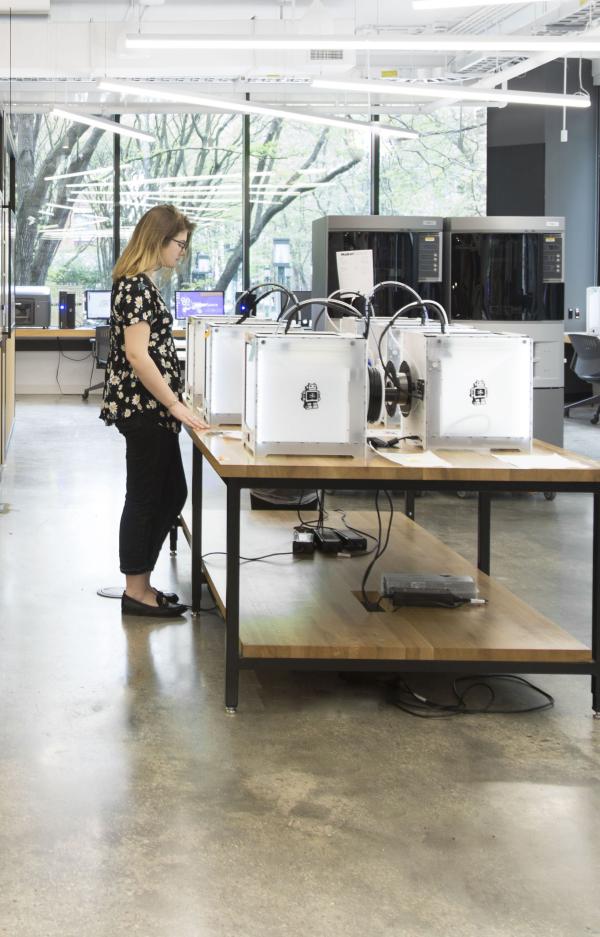
NYU Tandon is rooted in a vibrant tradition of entrepreneurship, intellectual curiosity, and innovative solutions to humanity’s most pressing global challenges.
Diversity and Inclusion
Diverse, inclusive, and equitable environments are not tangential or incidental to excellence, but rather are essential to it.
View Our News , Events , and Programs
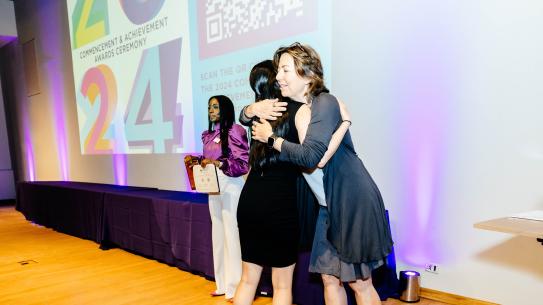
Tandon’s 2024 Commencement Awards celebrated student leaders and high achievers who made a positive impact
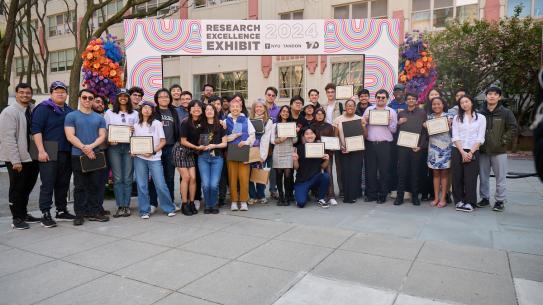
The 2024 Research Excellence Exhibit at NYU Tandon featured several stand-out projects

A more resilient New York: Made in Brooklyn
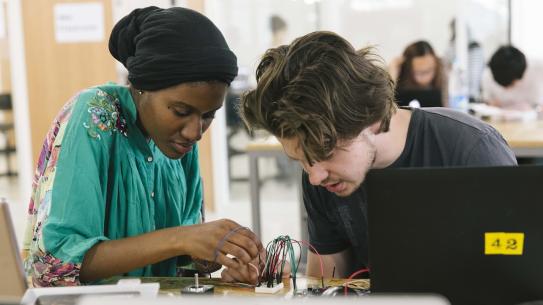
Experiential Learning Center
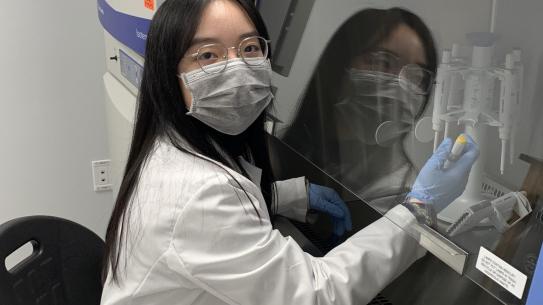
A member of the Department of Biomedical Engineering’s first doctoral cohort is honored by the American Heart Association

NYU researchers develop neural decoding that can give back lost speech

Cutting-edge enzyme research fights back against plastic pollution
From catalysis today.
Tandon Career Hub
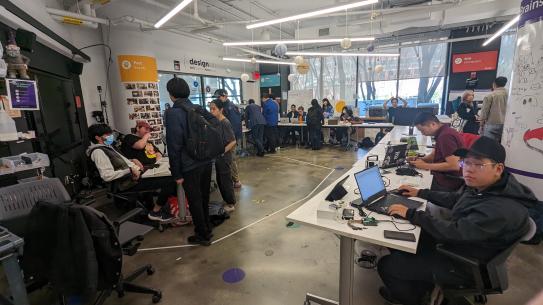
7th Annual Capstone Competition and Showcase
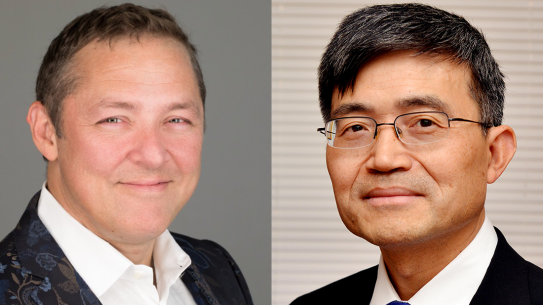
Two NYU Tandon professors are honored by the American Association for the Advancement of Science
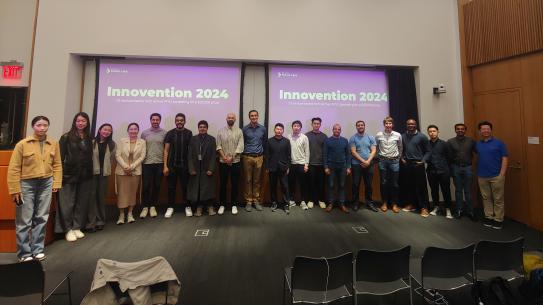
InnoVention 2024
NYU Ecosystem Hub launches to cross boundaries between the sciences and humanities
Biochemistry and Molecular Biology
Biostatistics
Environmental Health and Engineering
Epidemiology
Health Policy and Management
Health, Behavior and Society
International Health
Mental Health
Molecular Microbiology and Immunology
Population, Family and Reproductive Health
- Program Finder
- Admissions Services
- Course Directory
- Academic Calendar
- Hybrid Campus
- Lecture Series
- Convocation
- Strategy and Development
- Implementation and Impact
- Integrity and Oversight
- In the School
- In the Field
- In Baltimore
- Resources for Practitioners
- Articles & News Releases
- In The News
- Statements & Announcements
- At a Glance
- Student Life
- Strategic Priorities
- Inclusion, Diversity, Anti-Racism, and Equity (IDARE)
- What is Public Health?
The Challenges and Opportunities of an Aging Society
The new issue of Hopkins Bloomberg Public Health magazine explores how we can ensure that older adults remain as healthy as possible, for as long as possible. It also delves into the proliferation of counterfeit drugs, the repercussions of abortion bans, and the hunger gap facing adolescents.
Read the magazine Dean Mackenzie’s column
The Rise of Colorectal Cancers Among Younger People
Colorectal cancer diagnoses are rising in people under age 50. What’s behind this increase?
Bloomberg American Health Initiative Announces Eighth Cohort of Bloomberg Fellows
The Bloomberg American Health Initiative awards sixty individuals full scholarships to the Bloomberg School to address pressing public health challenges in the U.S.
Johns Hopkins Bloomberg School of Public Health Honors 1,273 New Graduates
Atul Gawande, assistant administrator for global health at USAID, joined Dean Ellen J. MacKenzie and student and faculty speakers at Bloomberg School’s 106 th convocation ceremony.
The Threat to Abortion Rights You Haven’t Heard Of
A century-old “zombie law” could usher in a nationwide abortion ban.
What to Know About COVID FLiRT Variants
A new family of COVID variants are becoming dominant in the U.S. at a crucial time for vaccine decision-making.
A Bold New Goal: Reduce Gun Violence 30% By 2030
The Center for Gun Violence Solutions has a new goal to reduce gun violence 30% by 2030.
Subscribe to Stay Informed
Connect with us, our academic program offerings.
Our programs welcome those from within and outside the traditional boundaries of public health. Whether you're a future college graduate, a midcareer public health leader, or someone looking to make a career change, we have a program for you.
Registration Now Open for the 2024 Summer Institutes
Designed for busy working professionals and students, the Johns Hopkins Bloomberg School of Public Health Summer Institutes allow you to complete credit or non-credit courses in a short period of time. With over 100 courses available, there is sure to be a course for everyone.
LEARN MORE REGISTER
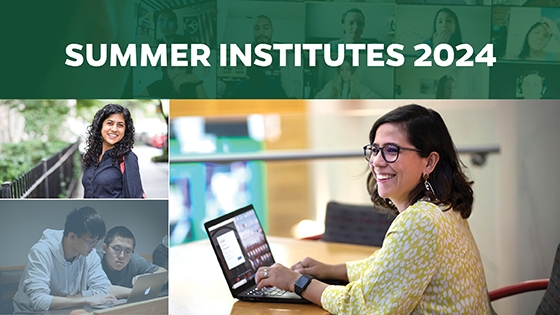
Master of Public Health (MPH)
The Master of Public Health (MPH) is our most flexible degree. With 12 concentrations to choose from, students can tailor their degree to their unique goals while completing classes at their own pace on campus, fully online, or a mix of the two.
We are accepting applications for the online/part-time format starting in November 2024 or January 2025.
Master of Science in Public Health (MSPH)
The Master of Science in Public Health (MSPH) is a professional degree alternative to the Master of Public Health (MPH) degree for students who want more focused skills in a specific field of public health or who lack two years of health-related work experience to begin or advance a career as a public health professional. MSPH programs generally require one academic year of coursework, followed by a field placement. The field placement duration and location vary by department/concentration.

Why Choose the Johns Hopkins Bloomberg School of Public Health?
Ranked by U.S. News & World Report since 1994
and Largest School of Public Health
Courses Offered
Research Centers and Institutes
Alumni Living in over 160 Countries
Degree Programs
Certificate Programs
Student-to-Primary-Faculty Ratio
Our Departments
Meet our faculty.
Our faculty are world-renowned experts, and trusted advisers to our students, public health leaders, and the public.
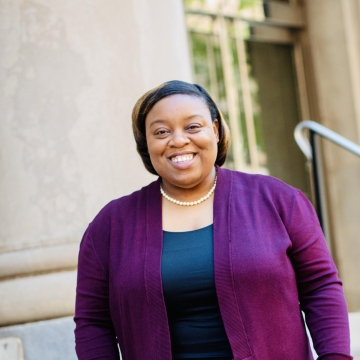
Tanjala S. Purnell
Tanjala S. Purnell, PhD '12, MPH, uses epidemiology and health services research to advance equity in transplantation and related conditions, including kidney diseases, hypertension, and diabetes.

Barry Zirkin
Barry Zirkin, PhD, is a reproductive biologist involved in studies of the effects of aging and environmental toxicants on testicular testosterone production and spermatogenesis.

Gurumurthy Ramachandran
Gurumurthy Ramachandran, PhD, MS, conducts research focused on developing effective and accurate methods to assess health-related human exposure in occupational and non-occupational settings.

Avonne E. Connor
Avonne E. Connor, PhD, MPH, is a cancer epidemiologist who studies breast cancer and cancer health disparities among women and underserved populations across the cancer continuum.
Join Us in Baltimore
Pursue a degree at the #1 school of public health in one of America's best cities. With 50+ museums, a bustling restaurant scene, gorgeous parks, and more, Baltimore is a great place to study and live.
LEARN ABOUT BALTIMORE
Support Our Work
Our work is made possible in part by contributions from Bloomberg School donors.
- Skip to main menu
- Skip to user menu
What jobs can you get with a biomedical science degree - A New Scientist Careers Guide
- Finding a job
- Career guides
What jobs can you get with a biomedical science degree?
Biomedical sciences include a wide range of scientific disciplines focused on human health. A degree in biomedical science showcases a good understanding of the human body and disease processes. Graduates learn various advanced research methods aiming to improve diagnosis and treatment of medical conditions.
Studying at one of the best universities for biomedical science in the UK, as listed in the 2024 Complete University Guide, can open doors to many well-paying jobs . Institutions such as the University of Cambridge, University College London, the University of Oxford, Imperial College London and Durham University have established a strong reputation in this space.
A course as diverse as biomedical science can land you a job in several different sectors. The most common industries include: life sciences and academic research, clinical science, technology and engineering, and business and finance. This article discusses the top three highest-paying jobs with a biomedical science degree in these fields.
Life sciences & academic research
Biomedical science is one of the most rapidly evolving scientific disciplines, contributing to a substantial amount of high-impact research and medical advancements. Biomedical scientists opting for more traditional career paths normally work at research institutions or universities.
- University professor
Job role: Professors teaching students doing a biomedical science degree at university typically specialise in a specific discipline, such as cell biology , molecular biology or human anatomy. They are leading experts in their field and conduct research in niche areas, such as stem cells or gene editing .
Route: You can either complete a master’s degree prior to starting a PhD or start a PhD immediately after your undergraduate degree if you performed exceptionally well. As a post-doc, you will spend a significant period of time conducting research and lecturing before you can apply for professorship.
Average salary (experienced): £55,000; over £100,000 at some universities e.g. Imperial College London
- Pharmacologist
Job role: Pharmacologists analyse the biomolecular and physiological effects of various drugs and compounds on the human body. They predominantly work in a lab setting, designing studies and interpreting data to advance drug development . As such, they ensure the efficacy and safety of drugs for human consumption.
Route: While a degree in pharmacology is preferred, biomedical sciences, microbiology and physiology are also acceptable. Employers often seek candidates with postgraduate training and/or some experience in research or industry. For those aspiring to work in academia and teach at university, a PhD is typically required.
Average salary (experienced): £55,000
- Sports physiologist
Job role: Sports physiologists possess excellent understanding of human physiology. They help people optimise their athletic performance and general health. You could work in diverse settings, such as sports centres, hospitals or research institutions. Many additionally provide private consultations, offering advice to a variety of clients, including athletes.
Route: Typically, a degree in physiology, biology, biomedical science or other life science teaching integrated human physiology is required. Postgraduate training in sports physiology or exercise science could increase employment opportunities. Building a strong reputation could lead to opportunities such as starting your own consulting firm or working exclusively with elite athletes.
Average salary (experienced): £50,000
Clinical science
Biomedical scientists play an integral role in healthcare provision and the advancement of clinical science . In the UK, your degree will enable you to explore a plethora of jobs and opportunities offered by the National Health Service. To be able to take up any of the roles, you will need to register with the Health and Care Professions Council and complete the NHS Scientific Training Programme (STP) following your biomedical degree.
To start working as a clinical biomedical scientist trainee, your course must additionally be accredited by the Institute of Biomedical Science.
- Pathologist
Job role: Pathologists analyse tissue samples from patients to help diagnose medical conditions. They utilise sophisticated equipment, such as microscopes, and work primarily in hospital laboratories.
Route: Biomedical science is one of the preferred degrees to obtain prior to completing STP. Once you qualify, you could further specialise in a niche subfield and enter the Higher Specialist Scientist Training (HSST) program to become a consultant pathologist.
Average salary (experienced): £69,000
- Clinical scientist
Job role: Clinical scientists work as part of a multidisciplinary team in specialised areas such as critical care, biochemistry and genomics, contributing to efficient and safe healthcare delivery. Duties vary based on specialisation and may include laboratory work or involve direct patient contact, diagnosis and treatment.
Route: A biomedical science degree provides a solid foundation for various specialisms within clinical science. With experience, you could take on managerial responsibilities or move into healthcare-related industries such as biotechnology . You could also complete HSST to achieve consultant status in your field.
Average salary (experienced): £68,000
- Audiologist
Job role: Audiologists assess individuals’ hearing and may work in hospitals or retail stores. Their duties include fitting, testing and repairing different types of hearing aids for their patients or clients. They often undertake ear wax removal and offer advice on ear health and hygiene.
Route: Biomedical sciences, anatomy and neuroscience are some of the favourable pre-STP degrees for this role. With experience, you could manage hospital audiology departments, become a director of a store or specialise in areas such as cochlear implants. There is tremendous potential in the private sector.
Average salary (experienced): £65,000
Technology & engineering
Biomedical science graduates have great potential in the tech industry, particularly in fields such as biotechnology and health tech. With a strong background in medical science, they can contribute significantly to this sector as they understand the technological needs in medical research and healthcare.
- IT systems architect
Job role: IT architects play a vital role in ensuring the smooth operation of a business. They are responsible for designing IT systems and software that align with their clients' technical needs. This work can be carried out either at their own office, at a client's office or remotely from home. With a degree in biomedical sciences, you could be an invaluable asset to health tech, biotech or pharmaceutical firms.
Route: You typically need a software engineering , maths or computer science degree. However, you can develop skills for this role by pursuing a master’s degree in a computer science subject after biomedicine or becoming self-taught. Your biomedical background may give you a competitive edge when applying to relevant companies. With experience, you could work as a consultant or run your own firm.
Average salary (experienced): £90,000
- Data scientist
Job role: Data science is considered one of the most lucrative fields in the tech sector. Data scientists are particularly important within life sciences as “big data” is generated constantly. Biomedical data scientists could work in a variety of settings, from universities to biotechnology firms, performing data analysis to provide actionable insights.
Route: Following your biomedical degree, you could either complete a master's degree in data science or teach yourself, as there are a huge number of online resources available. Machine learning and artificial intelligence can substantially enhance your job prospects. With experience, you could become a principal data scientist at a biotech company or an independent data science consultant.
Average salary (experienced): £82,500
- Biomedical engineer
Job role: Biomedical engineers integrate concepts from biology, physics and engineering to develop medical machinery and devices, encompassing prosthetics, surgical robots and imaging devices . They research and design novel tools or devices that may aid clinical staff with their work or improve patient outcomes.
Route: While a primary biomedical engineering degree is the conventional path for this role, entry is still possible with a biomedical science degree. You would be expected to complete postgraduate biomedical engineering training or gain experience by taking up junior roles, such as a biological technician.
Experienced biomedical engineers may specialise in specific areas, such as artificial organs, or work towards managerial positions in biotech firms.
Business & finance
Biomedical science doesn’t only equip graduates with scientific knowledge and technical skills, but also highly desirable transferable skills. Their excellent communication skills, analytical and critical thinking, numerical skills and problem-solving often help them thrive in business and the commercial sector.
- Managing director
Job role: Managing directors or CEOs ( chief executive officers ) are typically the face of an organisation. Their duties encompass various tasks, such as implementing policies, establishing the company's agenda, devising strategies to achieve goals, fostering relationships with business partners and task delegation.
Route: Although higher education isn’t required to ultimately become a CEO, due to rising competition, academic qualifications or other forms of training, such as apprenticeships, do give you a competitive edge.
A degree in biomedical sciences puts you in a strong position to venture into health tech or biotech. Your knowledge could help you understand and innovate the company’s products or services. Nevertheless, to secure a junior role and work up the ladder to the role of a director, you will need to acquire relevant business and management skills, either through work experience or postgraduate training.
Average salary (experienced): £120,000
- Investment analyst
Job role: Investment analysts advise fund managers, stockbrokers, traders,
investment management companies or other organisations on investment strategies. They monitor markets and performance of target companies to identify investment opportunities. With a biomedical science degree, you could specialise in biotech or pharmaceutical firms.
Route: After your BSc degree, you could study a business degree, e.g. a master’s in business administration (MBA), or apply for graduate training schemes at investment banks. To fully qualify as an investment analyst, you must pass an exam approved by the Financial Conduct Authority, such as the investment management certificate or investment advice diploma.
Once you have established a decent reputation, you could become a fund manager, run your own investment bank or work as a freelance investment consultant.
Average salary (experienced): £65,000
- Management consultant
Job role: Consultancy involves advising organisations on ways to tackle business issues and improve operational efficiency. Management consultants work with various members of a company and analyse data to understand problems. They then make recommendations to their clients and support them with the implementation of a solution.
Route: As with investment banking, you could pursue an MBA or other relevant business degree, complete an internship or join a graduate training scheme at a firm. Whichever route you choose, ensure you develop a good grasp of business management skills, analytical thinking and customer service skills. With experience, you could become a partner at a company, run your own firm or work as a freelancer.
You may wish to apply for chartered status to demonstrate that your skills and knowledge meet industry standards.
Average salary (experienced): £60,000
Across several industries, there is no shortage of biomedical science graduate jobs. Your degree is one of the most highly valued within and outside the field of biomedical sciences. What is crucial is to tailor your programme according to your goals and gain relevant work experience and training during or after your course.
Resources
- Explore careers | National Careers Service [Internet]. Available from: https://nationalcareers.service.gov.uk/explore-careers
- Biomedical Sciences Rankings 2024 [Internet]. The Complete University Guide. Available from: https://www.thecompleteuniversityguide.co.uk/league-tables/rankings/biomedical-sciences
- Home | Advance HE [Internet]. Available from: https://www.advance-he.ac.uk/
- Careers in pharmacology | British Pharmacological Society [Internet]. Available from: https://www.bps.ac.uk/careers
- Careers Centre | British Association of Sports and Exercise Sciences (BASES). Available from: https://www.bases.org.uk/spage-students-careers_centre.html
- NSHCS [Internet]. NSHCS. Available from: https://nshcs.hee.nhs.uk/healthcare-science/healthcare-science-specialisms-explained/
- NSHCS [Internet]. NSHCS. Available from: http://www.nshcs.hee.nhs.uk/programmes/stp
- Institute of Analytics - The Future is Here! [Internet]. IoA - Institute of Analytics. Available from: https://ioaglobal.org/
- Get into tech: How to launch a career in IT | BCS [Internet]. Available from: https://www.bcs.org/it-careers/get-into-tech-how-to-build-a-career-in-it/
- Medical engineering [Internet]. Health Careers. 2019. Available from: https://www.healthcareers.nhs.uk/explore-roles/healthcare-science/roles-healthcare-science/physical-sciences-and-biomedical-engineering/medical-engineering
- Membership | CFA Institute. Available from: https://www.cfainstitute.org/membership
- Institute of Consulting. Chartered Management Institute (CMI). Available from: https://www.managers.org.uk/institute-of-consulting/
Share this article
Related articles

What Does A Global Head of R&D Do?

How to become a biomedical engineer - A New Scientist Careers Guide

What Jobs Can You Get With A Criminology Degree - A New Scientist Careers Guide
Latest articles.

open Quick Links
- Jobs & Scholarships
- Software Downloads
open Colleges
- Arts and Letters
- Fowler College of Business
- Engineering
- Graduate Studies
- Health and Human Services
- SDSU Library
- Professional Studies and Fine Arts
- Weber Honors College
open Other Locations
- SDSU Georgia
- SDSU Global Campus
- SDSU Imperial Valley
- SDSU Mission Valley
- College of Engineering
- Electrical and Computer Engineering
Graduate Programs
Admission to msee & mscompe programs.
Every applicant must meet the minimum requirements given below. However, merely satisfying these requirements does not guarantee admission.
- The application window for Spring 2024 will be from August 1, 2023 to August 31, 2023.
- The application window for Fall 2024 will be from October 1, 2023 to February 1, 2024.
Admission to Classified Standing (Domestic):
Applicants must meet the following minimum requirements:
- Bachelor's degree in Electrical or Computer Engineering from an ABET accredited engineering program in the USA.
- A minimum grade point average of 2.85 (based on 4.0 scale) in the last 60 semester (90 quarter) units of technical course work.
Admission to Classified Standing (International):
International applicants must meet the following minimum requirements:
- Bachelor’s degree in Electrical, Electronics, Instrumentation or Computer Engineering from a recognized engineering program.
- An equivalent grade point average of 3.0 (based on 4.0 scale) or higher in all technical course work.
- A minimum TOEFL score of 85 or minimum IELTS score of 6.5. Please note that the minimum TOEFL score required by the program is higher than the minimum required score of the university.
- International applicants may submit an evaluation report from IERF, WES, or ECE for faster processing.
For international students with admission questions, please contact the International Admissions Office at [email protected] or go to their website https://admissions.sdsu.edu/international/graduate .
Graduate Record Examination (GRE)
GRE scores are not required.
Test of English as a Foreign Language (TOEFL)
TOEFL or equivalent scores for the Spring 2024 and Fall 2024 admission cycles will be required .
Statement of Purpose (SOP)
The Electrical Engineering program does not require a Statement of Purpose (SOP) as it is not taken into consideration with making admission decisions. Please do not send an SOP.
Unofficial Transcripts and Letters of Recommendation (LOR)
Unofficial transcripts and one mandatory LOR are required for both the MSEE and MSCompE degree applicants. Applicants should upload their unofficial transcripts and LOR to Interfolio:
- Computer Engineering (Spring 2024): https://apply.interfolio.com/128692
- Electrical Engineering (Spring 2024): https://apply.interfolio.com/128924
- Computer Engineering (Fall 2024): https://apply.interfolio.com/131275
- Electrical Engineering (Fall 2024): https://apply.interfolio.com/131958
Please ensure that the LOR is submitted on an official letterhead of the organization that the referee is professionally affiliated with. The LOR should also have the referee’s official designation/rank in his/her organization. The referee should specify the capacity and duration for which he/she has known the applicant. The applicant’s first and last name along with the Red ID or EMPL ID (if possible) should be included in the letter. The letter can be uploaded in the form of a pdf file.
If you have questions regarding the submission of your unofficial transcripts and LORs, please contact Dr. Santosh Nagaraj at [email protected] . Please note your "official" transcripts will need to be sent to the Admissions Office (see the next paragraph regarding official documents) .
Submission of Official Documents
Submission of official documents, such as TOEFL score and official transcripts, need to be sent to the SDSU Graduate Admissions office. Documents sent to the department via email or regular mail/delivery services will not be accepted and will be discarded.
You must complete the Cal State Apply application and provide your official test scores and transcripts to the SDSU Graduate Admissions office (follow the instructions on Graduate Steps to Apply ).
For more information on how to apply please visit the Office of Admissions - SDSU Main Campus Master's Degrees page.
Important Note:
Please DO NOT send official documents to the department. All official documents should be sent to the SDSU Graduate Admissions office.
Scholarships and Financial Support
A limited number of resident tuition waiver scholarships are available for new students. These scholarships are highly competitive. Students who want to be considered for these scholarships must submit their applications as soon as possible. Applications received after JANUARY 15th will not be considered for scholarships.
Other means of financial support are also available for our graduate students, including Teaching Assistantship and Grader positions. Most of our faculty are carrying out cutting-edge research; they hire students as Research Assistants (or provide Tuition Assistance) to work on their sponsored research projects.
For more information on financial aid and scholarships please visit the Financial Aid and Scholarships site at https://sacd.sdsu.edu/financial-aid .
Professional Career Opportunities
San Diego is home to many hi-tech companies in wireless communication and networks, VLSI, signal processing, RF/microwave and bio-technology. Many of our graduates are employed by these companies.
Graduate students have many opportunities to work as interns in these companies. The ECE Department allows graduate students in good academic standing to work as interns through the Curricular Practical Training (CPT) program.
How to Apply
You may apply to the M.S.E.E program by using the information on the Office of Admissions - SDSU Main Campus Master's Degrees page. For additional information on San Diego State University's College of Graduate Studies please see the College of Graduate Studies website.
Admission for Veterans, Service Members, and Military Families
For information on admission for veterans, service members, and military families, please click on the Joan and Art Barron Veterans Center .
For Veterans Who Are Undergraduate or Graduate Students
The Troops to Engineers program provides specialized career assistance for student veterans seeking to improve their professional development skills, obtain paid internships and secure engineering specific employment upon graduation.
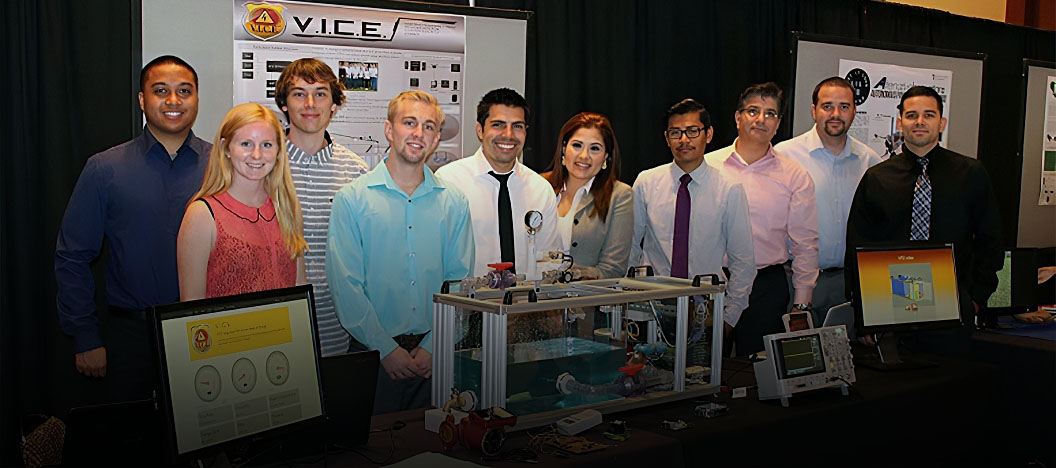
Welcome to Electrical and Computer Engineering
- MyU : For Students, Faculty, and Staff
William Arnold selected as a Fellow of AEESP
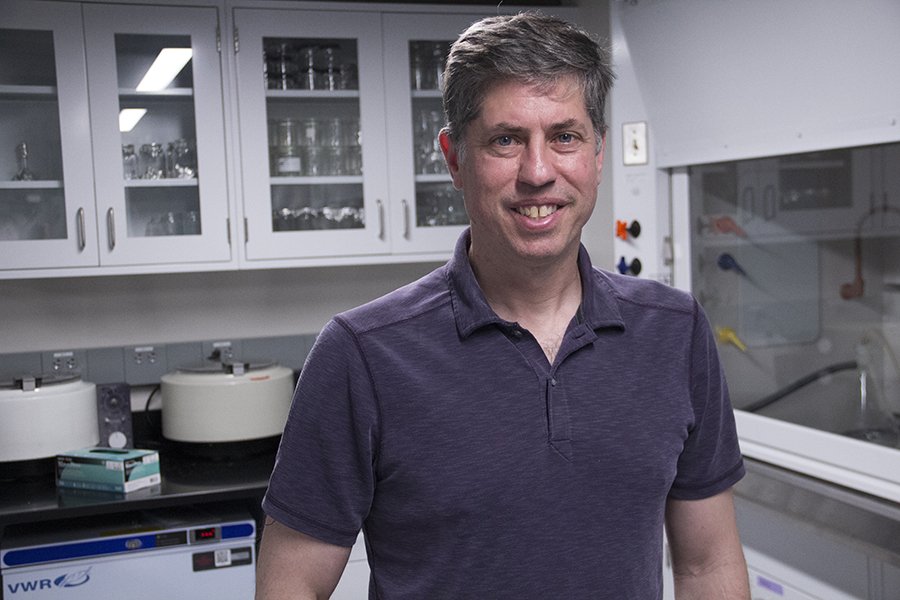
William Arnold has been named a 2024 Fellow of the Association of Environmental Engineering and Science Professors (AEESP). The official AEESP ceremony will be held June 18, 2024.
Arnold is a Distinguished McKnight University Professor and the Joseph T. and Rose S. Ling Professor in the Department of Civil, Environmental, and Geo- Engineering at the University of Minnesota. He also serves as University of Minnesota Graduate Faculty in Water Resources Science, Graduate Faculty in Stream Restoration Science, is a Fellow at the Institute on the Environment and an Associate Fellow at the Minnesota Supercomputing Institute. William Arnold was selected as an AEESP Fellow based on his exemplary research and professional service.
His research efforts unraveled the fundamental chemistry of organic pollutant transformation in aquatic environments. His efforts have led to improved understanding of reaction rates and byproducts and development of water treatment and remediation techniques.
His innovative research in this area led directly to the banning of triclosan use in Minnesota, the development of new treatment technologies, and stronger predictive models, all of which safeguard public and ecological health. Most recently, Arnold’s research has contributed to the development of new methods for quantifying and treating or retaining poly- and per-fluorinated compounds.
His service to AEESP includes service on six different AEESP committees (chairing two) and on the Board of Directors, ultimately serving as President for 2021-2022. Arnold helped the organization navigate through the COVID-19 pandemic finding new ways to connect as a community. During his time as President (and president-elect before that), he helped implement the strategic plan developed under Joel Ducoste. Three key accomplishments of his term as President included, first, the establishment of a community engaged research task force to provide resources and a community of practice for those that engage with the public. The second was becoming part of the ACCESS+ cohort of professional societies, which allowed the organization to ensure that all members are welcome and represented in the organization. Lastly, Arnold co-led, with Jennifer Becker and Ray Hozalski, a fundraising effort to establish the new Edward Bouwer doctoral dissertation award.
In the larger community, Arnold is often sought after to serve on committees for the National Academies and various advisory boards, including the Scientific Advisory Board for the San Francisco Estuary Institute and an Environmental Defense Fund working group.
His colleague and department head, Paige Novak, describes Bill as an ideal scholar/leader who is making significant contributions to research and education.
Going forward, Arnold plans to remain active within AEESP and continue to seek out opportunities for the group to provide value to its members. He is particularly interested in mentorship for mid-career faculty. He will continue to promote and advise the organization, which he describes as his “home…where I can be an educator, a researcher, and a learner.”
William Arnold's Research Group at University of Minnesota
- Future undergraduate students
- Future transfer students
- Future graduate students
- Future international students
- Diversity and Inclusion Opportunities
- Learn abroad
- Living Learning Communities
- Mentor programs
- Programs for women
- Student groups
- Visit, Apply & Next Steps
- Information for current students
- Departments and majors overview
- Departments
- Undergraduate majors
- Graduate programs
- Integrated Degree Programs
- Additional degree-granting programs
- Online learning
- Academic Advising overview
- Academic Advising FAQ
- Academic Advising Blog
- Appointments and drop-ins
- Academic support
- Commencement
- Four-year plans
- Honors advising
- Policies, procedures, and forms
- Career Services overview
- Resumes and cover letters
- Jobs and internships
- Interviews and job offers
- CSE Career Fair
- Major and career exploration
- Graduate school
- Collegiate Life overview
- Scholarships
- Diversity & Inclusivity Alliance
- Anderson Student Innovation Labs
- Information for alumni
- Get engaged with CSE
- Upcoming events
- CSE Alumni Society Board
- Alumni volunteer interest form
- Golden Medallion Society Reunion
- 50-Year Reunion
- Alumni honors and awards
- Outstanding Achievement
- Alumni Service
- Distinguished Leadership
- Honorary Doctorate Degrees
- Nobel Laureates
- Alumni resources
- Alumni career resources
- Alumni news outlets
- CSE branded clothing
- International alumni resources
- Inventing Tomorrow magazine
- Update your info
- CSE giving overview
- Why give to CSE?
- College priorities
- Give online now
- External relations
- Giving priorities
- CSE Dean's Club
- Donor stories
- Impact of giving
- Ways to give to CSE
- Matching gifts
- CSE directories
- Invest in your company and the future
- Recruit our students
- Connect with researchers
- K-12 initiatives
- Diversity initiatives
- Research news
- Give to CSE
- CSE priorities
- Corporate relations
- Information for faculty and staff
- Administrative offices overview
- Office of the Dean
- Academic affairs
- Finance and Operations
- Communications
- Human resources
- Undergraduate programs and student services
- CSE Committees
- CSE policies overview
- Academic policies
- Faculty hiring and tenure policies
- Finance policies and information
- Graduate education policies
- Human resources policies
- Research policies
- Research overview
- Research centers and facilities
- Research proposal submission process
- Research safety
- Award-winning CSE faculty
- National academies
- University awards
- Honorary professorships
- Collegiate awards
- Other CSE honors and awards
- Staff awards
- Performance Management Process
- Work. With Flexibility in CSE
- K-12 outreach overview
- Summer camps
- Outreach events
- Enrichment programs
- Field trips and tours
- CSE K-12 Virtual Classroom Resources
- Educator development
- Sponsor an event
Jun 13 (Thu) @ 11:00am: ”Biomechanical Transmission as a Channel for Touch Information in Human Tactile Sensing,” Neeli Tummala, ECE PhD Defense
Touching an object with our hands generates skin oscillations that are biomechanically transmitted throughout the upper limb, exciting thousands of sensory neurons that convey touch information to the brain. In this dissertation, I investigate the implications of this neuromechanical process for human touch perception and engineering through data-driven computational modeling based on high-resolution skin measurements and grounded in linear systems theory. My findings establish that biomechanical transmission supports human tactile sensing by acting as a channel through which touch information is filtered and disseminated across large populations of sensory neurons. I also demonstrate how biomechanical transmission can be exploited in wearable technologies by presenting a device for digitally transcribing tactile sign language, a form of communication used by people who are deafblind. Ultimately, my work expands our understanding of the human tactile system and introduces principles and tools that could be leveraged for the design of haptic devices and for artificial tactile sensing in robotics and prosthetics.
Neeli Tummala is a Ph.D. candidate in the Electrical and Computer Engineering Department at the University of California Santa Barbara where she is advised by Professor Yon Visell. Neeli earned her B.S. in Electrical Engineering and Computer Sciences from the University of California, Berkeley in 2018 and M.S. in Electrical and Computer Engineering from the University of California, Santa Barbara in 2020. Her research has been recognized through several awards, including Best Paper at the 2024 IEEE Haptics Symposium, Best Talk at the 2023 Festival of Touch symposium, and Best Paper Runner-Up at the 2022 IEEE Haptics Symposium. She has also been supported by several fellowships during her graduate studies including the UC Santa Barbara Graduate Opportunity Fellowship and the Link Foundation Modeling, Simulation, and Training Fellowship. Neeli’s research aims to advance our understanding of the mapping between physical interactions with the environment and touch perception, with applications spanning neuroscience, haptics and neuroengineering.
Hosted by : Professor Yon Visell
Submitted by : Neeli Tummala <[email protected]>
- +1 805.893.5364
- [email protected]
- Office Harold Frank Hall, Rm 4155
Dept. Resources
- Services & Support
- Cntrl Admin Office (CAO)
- Electronics Shop
- Technical Support
- Room Reservations
- Submit Event | News | Book
- Information
- Terms of Use
Department of Electrical and Computer Engineering College of Engineering • UC Santa Barbara 2023 © Regents of the University of California
- ENGR Direct
- Departments
- Undergraduate Education
- Graduate Education
- Dual Degrees
- Executive Education
- Student Life
- Strategic Plan
- Program Rankings
- Program Enrollments and Degrees
- Faculty Technology Studio
- National Medals of Science and Technology
- Accreditation
- About the Cockrell Family
- Brand Resources
- Minors and Certificates
- Academic Advising
- Student Success Initiatives
- Study Abroad
- Certificates
- Graduate Coordinators and Advisors
- Engineering Honors Program
- External Transfer
- Internal Transfer
- Calculus Readiness Requirement
- Prospective Undergraduate Info Sessions
- Info for Admitted Students
- Scholarships and Aid
- Graduate Funding
- Tuition Waivers
- Virtual Visit
- Areas of Impact
- Human Health
- Manufacturing
- Energy, Environment and Sustainability
- Intelligent Systems and Human-Machine Symbiosis
- Complex Systems and Networks
- Research Centers
- Bridging Barriers
- Texas Innovation Center
- Office of the Associate Dean for Research
- First-Year Experience
- Career Fairs
- Co-ops and Internships
- Externships
- Salaries and Statistics
- Information for Employers
- Student Organizations
- Engineering Student Success Center
- The LeaderShape Institute
- Undergraduate Research Opportunities
- Entrepreneurship
- Short-Term Programs
- Semester-Exchange Programs
- Advising and Planning
- Application
- Stay Connected
- Distinguished Alumni Awards
- Advisory Boards
- About Our Alumni
- Student Recruitment
- Student Projects and Programs
- Professional Education
- K-12 Outreach
- Areas to Support
- Ways to Give
Humanitarian Engineering
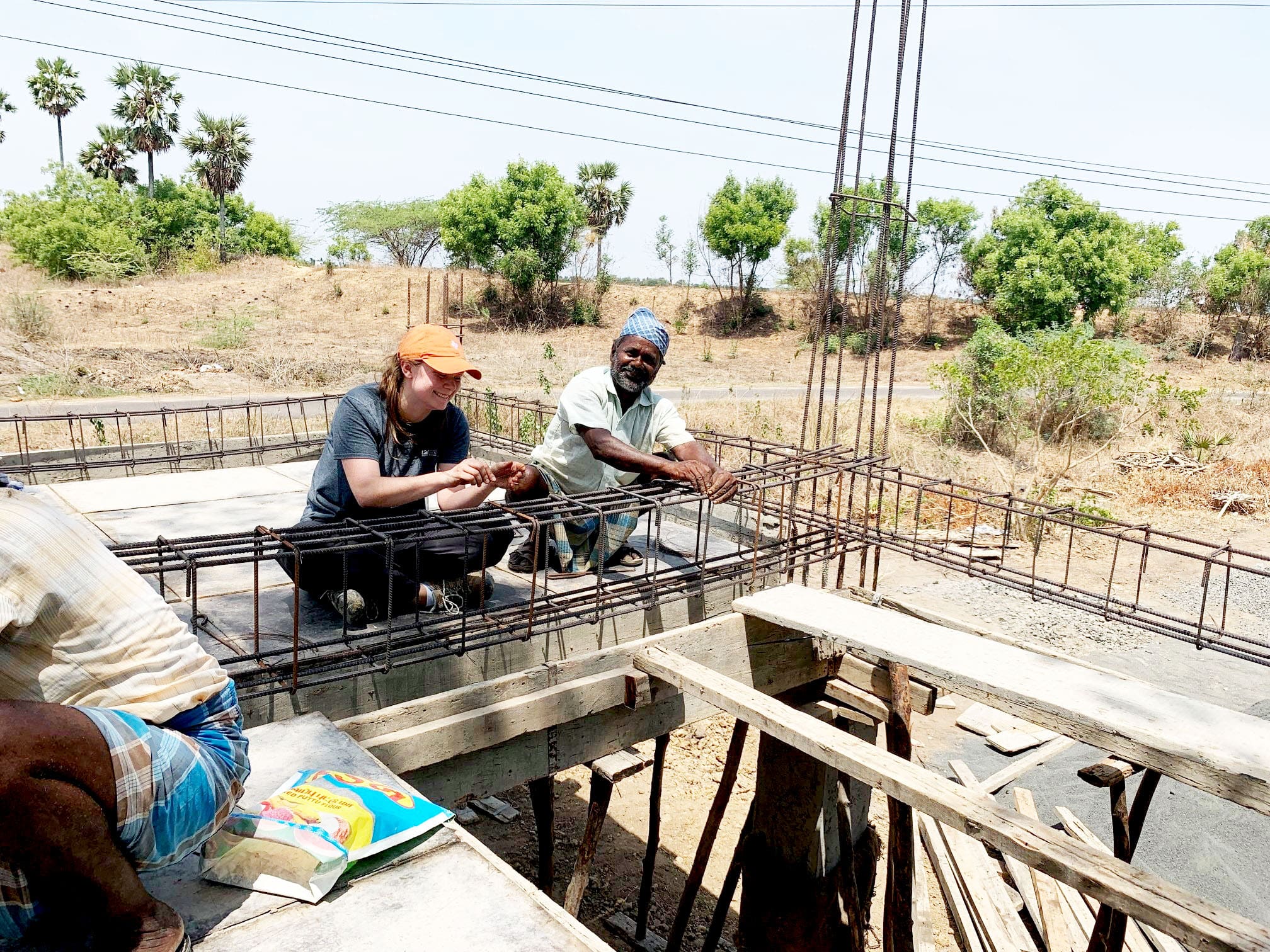
Engineering for the Betterment of Communities
The engineering profession has long been proud of its world-changing contributions through infrastructure, water treatment, medical devices, computers and many other technological advancements that continually impact society. The Cockrell School’s Humanitarian Engineering Program takes engineering for society to the next level, providing undergraduate students with rewarding, multidisciplinary opportunities to focus their learning around communities that need their help the most. Opportunities include:
Humanitarian Product Development Course
Students work in small teams to address needs of people in underserved communities such as refugees, displaced people, and others who have limited resources. Over the course of two semesters, teams work to research, conduct experiments and create prototypes while learning about design, project management, prototyping and other principles of product development. Learn more
APPLY NOW FOR FALL 2024!
Projects with Underserved Communities
For engineering and social work students, Projects with Underserved Communities uses an innovative yearlong course sequence to hone students’ leadership skills and cultural competency while providing much-needed services to communities in developing countries. They collaborate with a local partner and travel to the community to implement the project during the summer following the completion of the academic course. Learn more
New Maymester 2023: Technology Needs of Refugee Camps in Greece
In this new Maymester, learn about technology needs in a refugee camp in Greece. Learn from experts on the refugee crisis and humanitarian needs. Conduct and analyze a survey of technology use in one camp and share results with local humanitarian organization. For more information, contact Dr. Janet Ellzey This email address is being protected from spambots. You need JavaScript enabled to view it. .
Certificate in Humanitarian Engineering
Students who pursue the certificate commit themselves to building better, safer, stronger communities by developing innovative solutions that improve lives. The certificate combines technical and non-technical coursework with project-based initiatives and includes course options in the colleges and schools of Liberal Arts, Communication, Natural Sciences, Engineering and more. Learn more
For more information, contact Dr. Janet Ellzey, Director of the Humanitarian Engineering Program and professor in the Walker Department of Mechanical Engineering, at This email address is being protected from spambots. You need JavaScript enabled to view it. .
Privacy Policy | Web Accessibility
Stay up to date with Cockrell School news!
Subscribe to our newsletter.
- Department of Aerospace Engineering & Engineering Mechanics
- Department of Biomedical Engineering
- McKetta Department of Chemical Engineering
- Maseeh Department of Civil, Architectural & Environmental Engineering
- Chandra Family Department of Electrical & Computer Engineering
- Walker Department of Mechanical Engineering
- Hildebrand Department of Petroleum & Geosystems Engineering

IMAGES
VIDEO
COMMENTS
The Humanitarian Engineering Program educates engineers and scientists to work as partners with communities seeking to enhance their social, environmental, and economic sustainability. ... Undergraduate students can also pick ECD or LSR as a focus area in the Design Engineering BS degree. Graduate students can enroll in a 9-credit certificate ...
Humanitarian Engineering and Science (HES) is an interdisciplinary, sociotechnical graduate program where student scientists and engineers work directly with communities to jointly define problems and create sustainable solutions. HES students choose from disciplinary tracks, including environmental engineering, geological engineering ...
12 international-themed graduate research topics studied. 3 Peace Corps Master's International Students mentored. 16 international senior capstone project teams mentored. 9 faculty teaching/co-teaching a humanitarian engineering, science and technology (HEST) course. 8 HEST courses (201, 310, 320, 411/511, 412/512, 241/541, 242/542, 444/544)
The Humanitarian Engineering and Science graduate program at the Colorado School of Mines stands out in the growing field of humanitarian engineering by blending social science with STEM expertise. Students learn from social scientists, engineers, and applied scientists to gain a truly interdisciplinary understanding of applied humanitarian ...
Director of the Humanitarian Engineering and Science graduate program. She is an anthropologist with two major research areas: 1) the sociocultural dynamics of extractive and energy industries, with a focus on corporate social responsibility, social justice, labor, and gender and 2) engineering education, with a focus on soci oeconomic class and
The Center delivers a rigorous curriculum in the context of global humanitarian issues through a new Humanitarian Engineering minor and an International Development track within the College's Sustainable Engineering graduate program. Equipped with academic fundamentals and the engineering design process, students and faculty members will engage with global partners to address complex ...
Graduate Program at Colorado School of Mines. Mines graduates make an impact on the world. With innovative science and engineering-based solutions, they help improve the human condition and quality of life in communities on local and global scales. And the Humanitarian Engineering and Science graduate programs at Mines provide the skills to ...
Humanitarian Engineering is an joint initiative of the three faculties Engineering Technology (ET), Geo-Information Science and Earth Observation (ITC) and Behavioural, Management and Social Sciences (BMS). Education and Research play an equally important role in Higher Education Institutions such as Universities.
The Colorado School of Mines has a post-graduate course in Humanitarian Engineering and Science. Taken online, the graduate certificate teaches sustainable development combined with engineering expertise and knowledge of applied sciences. On the course students conduct research and projects into communities in need of development or affected by ...
Humanitarian engineering applies science- and engineering-based solutions to improve quality of life in local and global communities by increasing the availability of basic human needs — such as clean water and sustainable energy, economic resilience, and disaster mitigation. The curriculum for the humanitarian engineering minor focuses on ...
Humanitarian engineers focus the skill and capabilities of engineering theory and practice toward aiding the greater good of humanity by offering stakeholder centric solutions to medical and disaster relief, global outreach, human displacement, human safety, food security, cultural awareness/sensitivity, and economic development. Engineers from ...
We are looking for prospective PhD or Masters of Research candidates with backgrounds in the areas of humanitarian and/or development aid. Applications are being accepted across faculties and disciplines. We encourage applications on topics that deal with humanitarian aid and response. Successful candidates will receive scholarships of $28,092 ...
Graduate Certificate Program Requirements. The Humanitarian Engineering and Science (HES) certificate is an online or residential program designed for working professionals as well as graduate students who are enrolled in other degrees at Mines but wish to gain knowledge in humanitarian engineering and science.To obtain a graduate certificate, students must complete a minimum of 9 credits of ...
Humanitarian Engineering reviews the development of engineering as a distinct profession and of the humanitarian movement as a special socio-political practice. ... David Munoz earned a PhD in Mechanical Engineering from Purdue University, Indiana. He has taught courses in thermodynamics, fluid mechanics, and heat transfer, and developed new ...
The Refugee Law Initiative (RLI) is a leading academic centre in the UK concentrating on international refugee law and policy. Read more. Funded PhD Programme (Students Worldwide) Humanities Research Programme. 1. 2. Find a PhD is a comprehensive guide to PhD studentships and postgraduate research degrees.
PhD's allow students to complete in-depth and extensive academic research. A PhD in a humanitarian subject is ideal for those wanting to conduct substantial research into humanitarian aid and related disciplines. Usually completed over 3 years full-time or 6 years part-time, a PhD in a humanitarian subject is great for students who want to go
Humanitarian Engineering, 3rd Edition (free download of book). 785 pages, 173 homework problems, .pdf file size is 24.2 MB. Released Oct. 12, 2016. Matlab code used for simulations: Downloading the book above also provides code for simulation results shown in the book and for homework problems. Supplementary documents: Downloading the book ...
Undergraduate Graduate Digital Learning Departments; Applied Physics Biomedical Engineering Center for Urban Science and Progress ... A member of the Department of Biomedical Engineering's first doctoral cohort is honored by the American Heart Association. News. NYU researchers develop neural decoding that can give back lost speech.
These programs marry technical curriculum with a background in professional skills like management, finance and communication. READ MORE. # 1. Massachusetts Institute of Technology. Cambridge, MA ...
The Master of Public Health (MPH) is our most flexible degree. With 12 concentrations to choose from, students can tailor their degree to their unique goals while completing classes at their own pace on campus, fully online, or a mix of the two. We are accepting applications for the online/part-time format starting in November 2024 or January 2025.
Humanitarian engineering is the application of engineering for humanitarian aid purposes. As a meta-discipline of engineering, humanitarian engineering combines multiple engineering disciplines in order to address many of the world's crises and humanitarian emergencies, especially to improve the well-being of marginalized populations. [1]
A Carnegie R1 public research institution, Clemson University is where purpose-driven students, faculty and staff collaborate on projects that impact our state, country and world. Across more than 80 undergraduate majors and 130 graduate degree programs, artists, scientists, authors and engineers begin the work that will define their careers ...
A master's degree in computer science is a graduate program focused on advanced concepts in computer science, such as software development, machine learning, data visualization, natural language processing, cybersecurity, and more. At this level, you'll often choose a field to specialize in.. Computer science master's programs build on your technical skill set while strengthening key ...
A course as diverse as biomedical science can land you a job in several different sectors. The most common industries include: life sciences and academic research, clinical science, technology and ...
Admission to Classified Standing (Domestic): Applicants must meet the following minimum requirements: Bachelor's degree in Electrical or Computer Engineering from an ABET accredited engineering program in the USA. A minimum grade point average of 2.85 (based on 4.0 scale) in the last 60 semester (90 quarter) units of technical course work.
William Arnold has been named a 2024 Fellow of the Association of Environmental Engineering and Science Professors (AEESP). The official AEESP ceremony will be held June 18, 2024. Arnold is a Distinguished McKnight University Professor and the Joseph T. and Rose S. Ling Professor in the Department of Civil, Environmental, and Geo- Engineering at the University of Minnesota. He also serves as ...
Complete two graduate-level UWM courses or transfer six credits of graduate work NOTE: Through the Accelerated Graduate Degree Program, qualified UWM undergraduates can earn up to six graduate credits while completing their bachelor's degree-eliminating the Graduate School Tuition and Fees for these six credits. $5,193.17: Semester 1
Neeli earned her B.S. in Electrical Engineering and Computer Sciences from the University of California, Berkeley in 2018 and M.S. in Electrical and Computer Engineering from the University of California, Santa Barbara in 2020.
Learn more. $20,010 USD tuition total $667 per credit hour, $20,010 for the full 30-credit master's degree. Pursue a high-quality education at a more affordable price. Pay-as-you-go tuition Only pay for the courses in your next session. You're free to take a session off without charges or penalties.
For more information, contact Dr. Janet Ellzey, Director of the Humanitarian Engineering Program and professor in the Walker Department of Mechanical Engineering, at [email protected]. A top 10 school and No. 1 in Texas, the Cockrell School of Engineering at The University of Texas at Austin develops courageous engineers who change the world.